
[17]
pleased. Will any man say, that any Right can be deri-
ved unto a Christian Church, over its Brethren, from a Tur-
kish Emperor? An Infidel, who has himself no Authority
to punish Christians for the Articles of their Faith, cannot
confer such an Authority upon any Society of Christians,
nor give unto them a Right which he has not himself.
This would be the Case at Constantinople. And the Reason
of the thing is the same in any Christian Kingdom. The
Civil Power is the same in every place: nor can that Pow-
er, in the Hands of a Christian Prince, confer any greater
Authority upon the Church, than in the Hands of a Hea-
then; which is to say, just none at all.
Nevertheless, it is worthy to be observed, and lamented,
that the most violent of these Defenders of the Truth,
the Opposers of Errors, the Exclaimers against Schism, do
hardly ever let loose this their Zeal for God, with which
they are so warmed and inflamed, unless where they have
the Civil Magistrate on their side. But so soon as ever
Court-favour has given them the better end of the Staff,
and they begin to feel themselves the stronger, then pre-
sently Peace and Charity are to be laid aside: Otherwise,
they are religiously to be observed. Where they have not
the Power to carry on Persecution, and to become Ma-
sters, there they desire to live upon fair Terms, and preach
up Toleration. When they are not strengthned with the
Civil Power, then they can bear most patiently, and un-
movedly, the Contagion of Idolatry, Superstition, and
Heresie, in their Neighbourhood; of which, in other Oc-
casions, the Interest of Religion makes them to be ex-
treamly apprehensive. They do not forwardly attack those
Errors which are in fashion at Court, or are countenanced
by the Government. Here they can be content to spare
their Arguments: which yet (with their leave) is the only
right Method of propagating Truth, which has no such
way of prevailing, as when strong Arguments and good
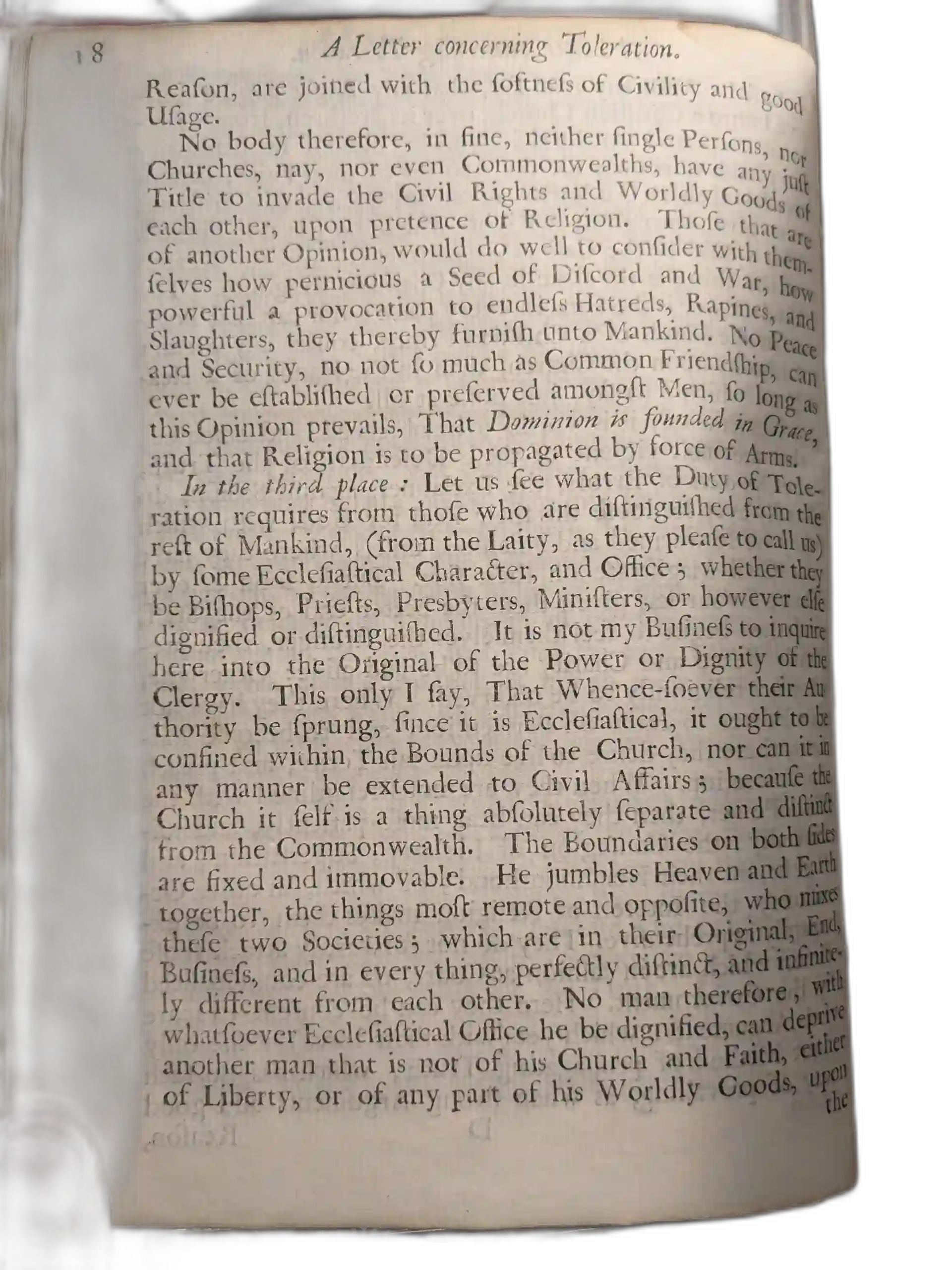
[18]
Reason, are joined with the softness of Civility and good
Usage.
No body therefore, in fine, neither single Persons, nor
Churches, nay, nor even Commonwealths, have any just
Title to invade the Civil Rights and Worldly Goods of
each other, upon pretence of Religion. Those that are
of another Opinion, would do well to consider with them-
selves how pernicious a Seed of Discord and War, how
powerful a provocation to endless Hatreds, Rapines, and
Slaughters, they thereby furnish unto Mankind. No Peace
and Security, no not so much as Common Friendship, can
ever be established or preserved amongst Men, so long as
this Opinion prevails, That Dominion is founded in Grace,
and that Religion is to be propagated by force of Arms.
In the third place: Let us see what the Duty of Tole-
ration requires from those who are distinguished from the
rest of Mankind, (from the Laity, as they please to call us)
by some Ecclesiastical Character, and Office; whether they
be Bishops, Priests, Presbyters, Ministers, or however else
dignified or distinguished. It is not my Business to inquire
here into the Original of the Power or Dignity of the
Clergy. This only I say, That Whence-soever their Au-
thority be sprung, since it is Ecclesiastical, it ought to be
confined within the Bounds of the Church, nor can it in
any manner be extended to Civil Affairs; because the
Church it self is a thing absolutely separate and distinct
from the Commonwealth. The Boundaries on both sides
are fixed and immovable. He jumbles Heaven and Earth
together, the things most remote and opposite, who mixes
these two Societies; which are in their Original, End,
Business, and in every thing, perfectly distinct, and infinite-
ly different from each other. No man therefore, with
whatsoever Ecclesiastical Office he be dignified, can deprive
another man that is not of his Church and Faith, either
of Liberty, or of any part of his Worldly Goods, upon
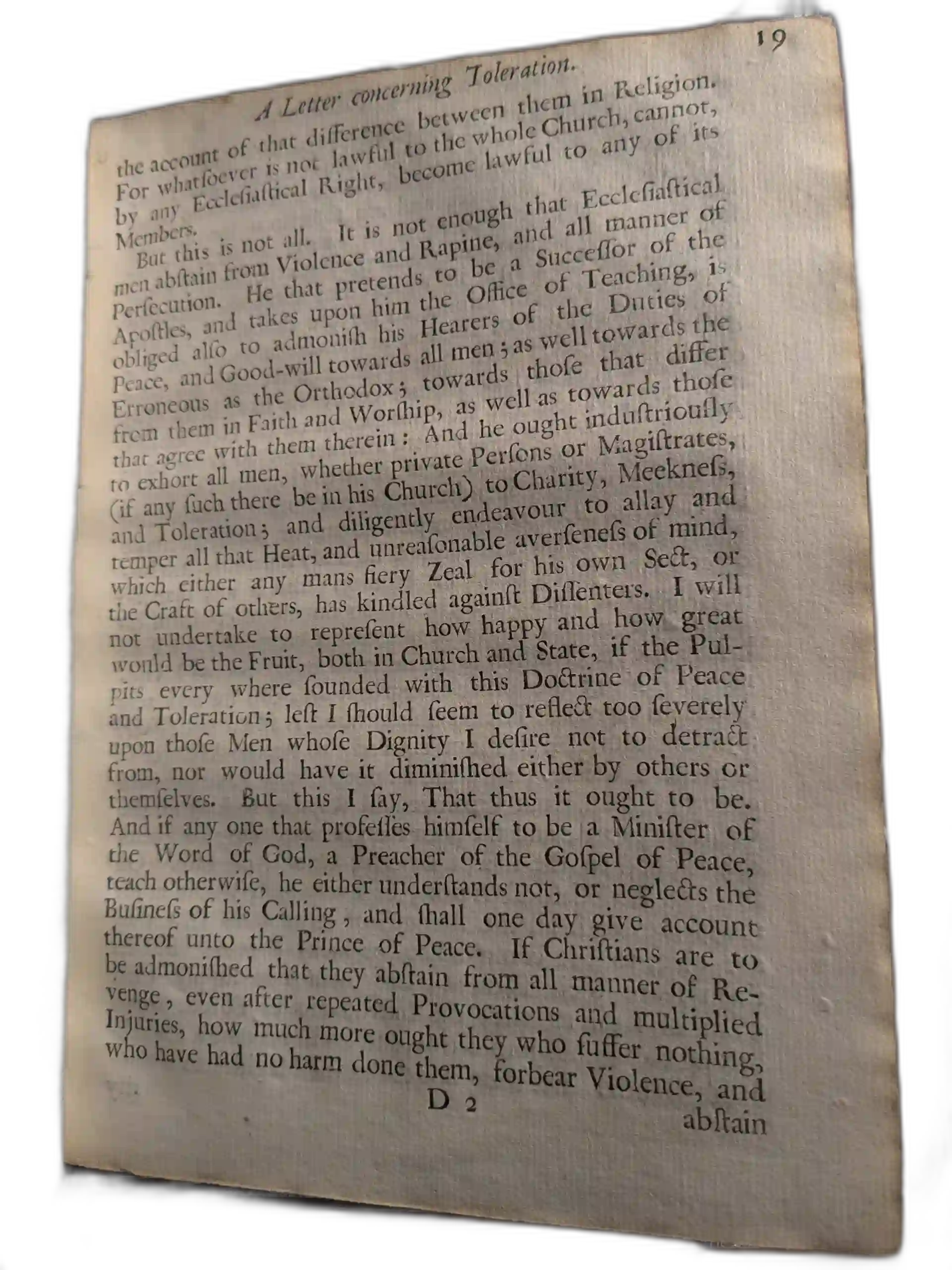
[19]
the account of that difference between them in Religion.
For whatsoever is not lawful to the whole Church, cannot,
by any Ecclesiastical Right, become lawful to any of its
Members.
But this is not all. It is not enough that Ecclesiastical
men abstain from Violence and Rapine, and all manner of
Persecution. He that pretends to be a Successor of the
Apostles, and takes upon him the Office of Teaching, is
obliged also to admonish his Hearers of the Duties of
Peace, and Good-will towards all men; as well towards the
Erroneous as the Orthodox; towards those that differ
from them in Faith and Worship, as well as towards those
that agree with them therein: And he ought industriously
to exhort all men, whether private Persons or Magistrates,
(if any such there be in his Church) to Charity, Meekness,
and Toleration; and diligently endeavour to allay and
temper all that Heat, and unreasonable averseness of mind,
which either any mans fiery Zeal for his own Sect, or
the Craft of others, has kindled against Dissenters. I will
not undertake to represent how happy and how great
would be the Fruit, both in Church and State, if the Pul-
pits every where sounded with this Doctrine of Peace
and Toleration; lest I should seem to reflect too severely
upon those Men whose Dignity I desire not to detract
from, nor would have it diminished either by others or
themselves. But this I say, That thus it ought to be.
And if any one that professes himself to be a Minister of
the Word of God, a Preacher of the Gospel of Peace,
teach otherwise, he either understands not, or neglects the
Business of his Calling, and shall one day give account
thereof unto the Prince of Peace. If Christians are to
be admonished that they abstain from all manner of Re-
venge, even after repeated Provocations and multiplied
Injuries, how much more ought they who suffer nothing,
who have had no harm done them, forbear Violence, and
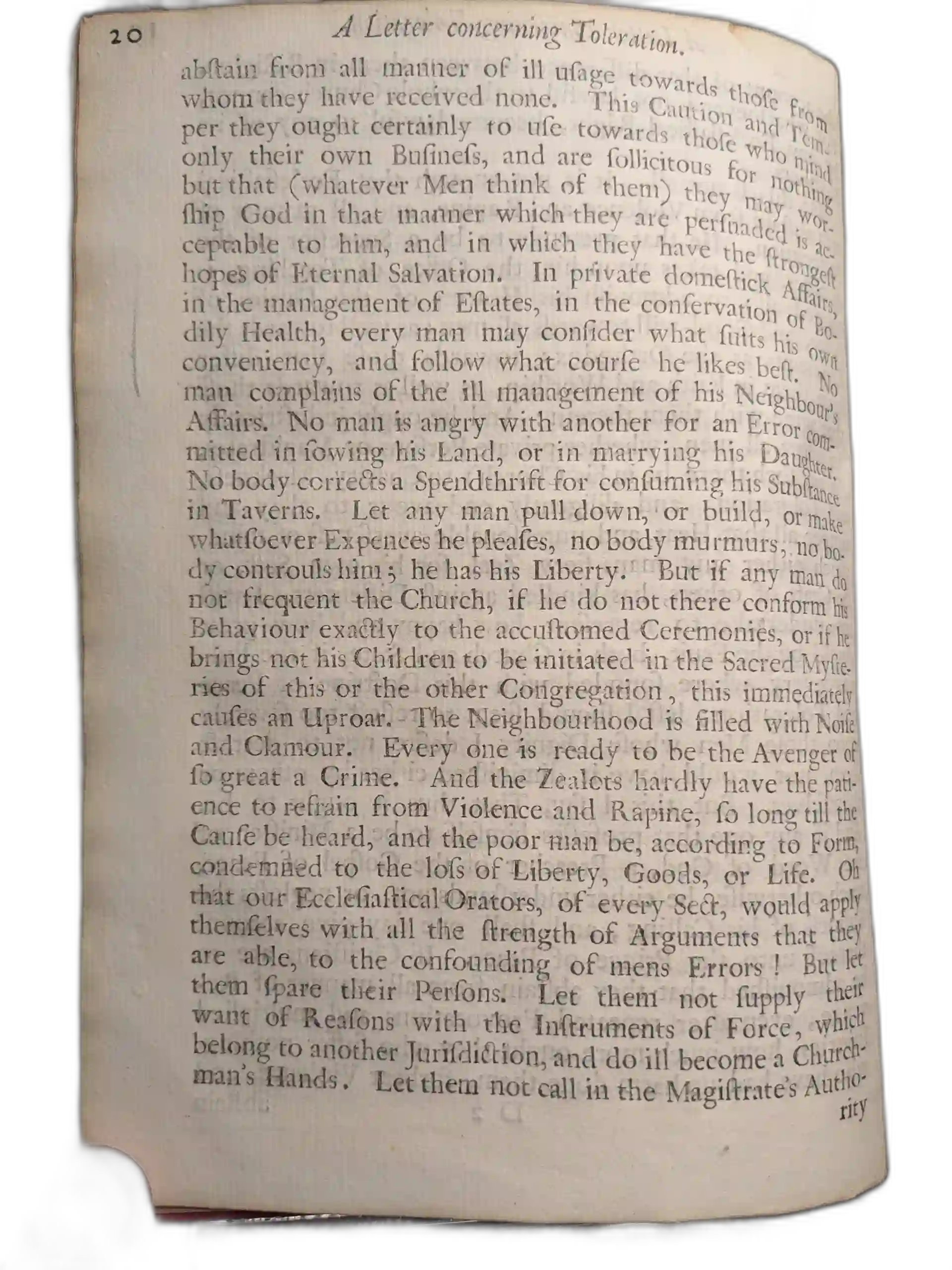
[20]
abstain from all manner of ill usage towards those from
whom they have received none. This Caution and Tem-
per they ought certainly to use towards those who mind
only their own Business, and are sollicitous for nothing
but that (whatever Men think of them) they may wor-
ship God in that manner which they are persuaded is ac-
ceptable to him, and in which they have the strongest
hopes of Eternal Salvation. In private domestick Affairs,
in the management of Estates, in the conservation of Bo-
dily Health, every man may consider what suits his own
conveniency, and follow what course he likes best. No
man complains of the ill management of his Neighbour’s
Affairs. No man is angry with another for an Error com-
mitted in sowing his Land, or in marrying his Daughter.
No body corrects a Spendthrift for consuming his Substance
in Taverns. Let any man pull down, or build, or make
whatsoever Expences he pleases, no body murmurs, no bo-
dy controuls him; he has his Liberty. But if any man do
not frequent the Church, if he do not there conform his
Behaviour exactly to the accustomed Ceremonies, or if he
brings not his Children to be initiated in the Sacred Myste-
ries of this or the other Congregation, this immediately
causes an Uproar. The Neighbourhood is filled with Noise
and Clamour. Every one is ready to be the Avenger of
so great a Crime. And the Zealots hardly have the pati-
ence to refrain from Violence and Rapine, so long till the
Cause be heard, and the poor man be, according to Form,
condemned to the loss of Liberty, Goods, or Life. Oh
that our Ecclesiastical Orators, of every Sect, would apply
themselves with all the strength of Arguments that they
are able, to the confounding of mens Errors! But let
them spare their Persons. Let them not supply their
want of Reasons with the Instruments of Force, which
belong to another Jurisdiction, and do ill become a Church-
man’s Hands. Let them not call in the Magistrate’s Autho-
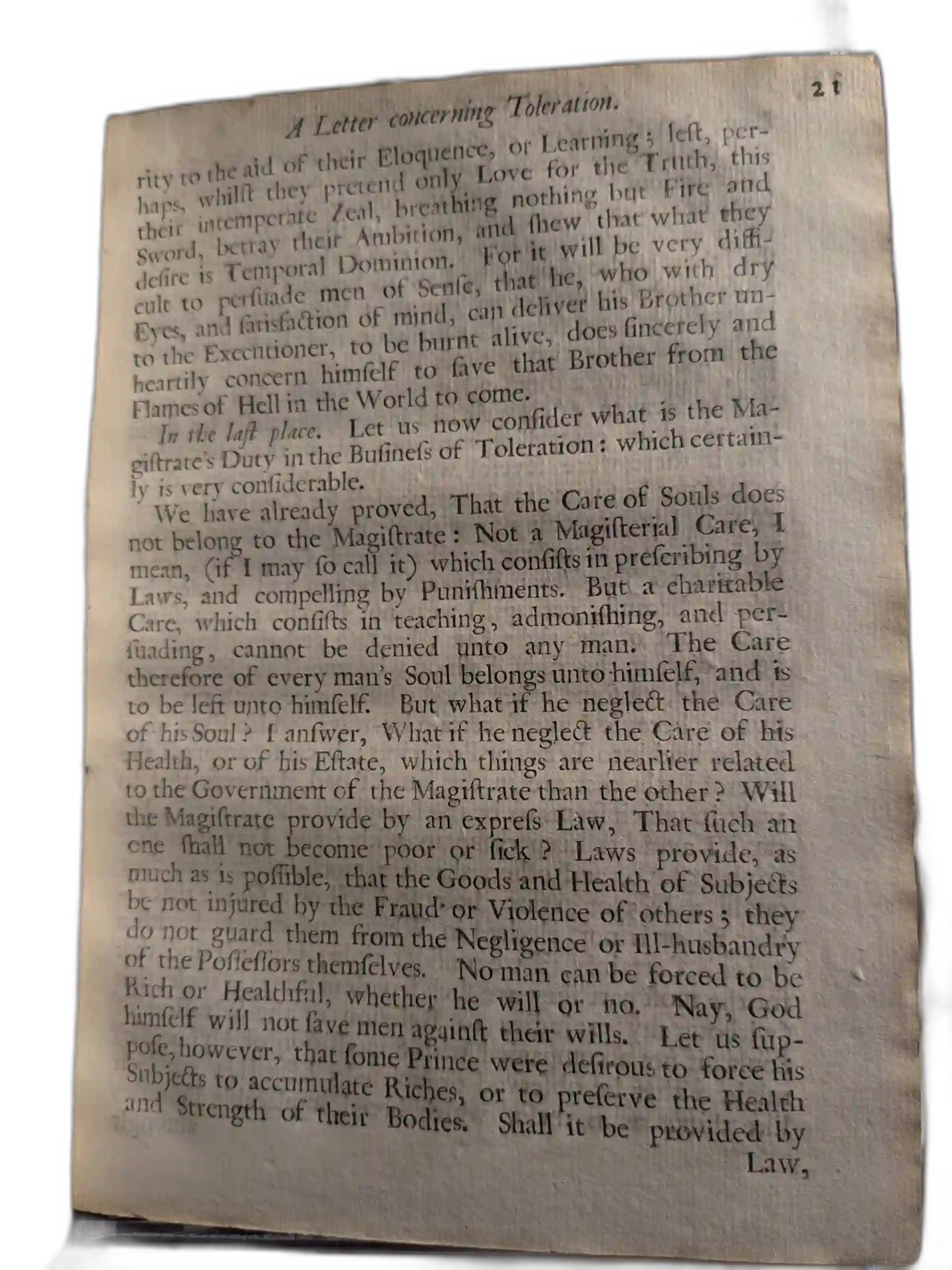
[21]
rity to the aid of their Eloquence, or Learning; lest, per-
haps, whilst they pretend only Love for the Truth, this
their intemperate Zeal, breathing nothing but Fire and
Sword, betray their Ambition, and shew that what they
desire is Temporal Dominion. For it will be very diffi-
cult to persuade men of Sense, that he, who with dry
Eyes, and satisfaction of mind, can deliver his Brother un-
to the Executioner, to be burnt alive, does sincerely and
heartily concern himself to save that Brother from the
Flames of Hell in the World to come.
In the last place. Let us now consider what is the Ma-
gistrate’s Duty in the Business of Toleration: which certain-
ly is very considerable.
We have already proved, That the Care of Souls does
not belong to the Magistrate: Not a Magisterial Care, I
mean, (if I may so call it) which consists in prescribing by
Laws, and compelling by Punishments. But a charitable
Care, which consists in teaching, admonishing, and per-
suading, cannot be denied unto any man. The Care
therefore of every man’s Soul belongs unto himself, and is
to be left unto himself. But what if he neglect the Care
of his Soul? I answer, What if he neglect the Care of his
Health, or of his Estate, which things are nearlier related
to the Government of the Magistrate than the other? Will
the Magistrate provide by an express Law, That such an
one shall not become poor or sick? Laws provide, as
much as is possible, that the Goods and Health of Subjects
be not injured by the Fraud or Violence of others; they
do not guard them from the Negligence or Ill-husbandry
of the Possessors themselves. No man can be forced to be
Rich or Healthful, whether he will or no. Nay, God
himself will not save men against their wills. Let us sup-
pose, however, that some Prince were desirous to force his
Subjects to accumulate Riches, or to preserve the Health
and Strength of their Bodies. Shall it be provided by

[22]
Law, that they must consult none but Roman Physicians,
and shall every one be bound to live according to their
Prescriptions? What, shall no Potion, no Broth, be ta-
ken, but what is prepared either in the Vatican, suppose,
or in a Geneva Shop? Or, to make these Subjects rich,
shall they all be obliged by Law to become Merchants, or
Musicians? Or, shall every one turn Victualler, or Smith,
because there are some that maintain their Families plenti-
fully, and grow rich in those Professions? But it may be
said, There are a thousand ways to Wealth, but one only
way to Heaven. ‘Tis well said indeed, especially by those
that plead for compelling men into this or the other Way.
For if there were several ways that lead thither, there
would not be so much as a pretence left for Compulsion. But
now if I be marching on with my utmost Vigour, in that
way which, according to the Sacred Geography, leads
streight to Jerusalem ; Why am I beaten and ill used by
others, because, perhaps, I wear not Buskins; because my
Hair is not of the right Cut; because perhaps I have not
been dip’t in the right Fashion; because I eat Flesh upon
the Road, or some other Food which agrees with my Sto-
mach; because I avoid certain By-ways, which seem unto
me to lead into Briars or Precipices; because amongst the
several Paths that are in the same Road, I choose that to
walk in which seems to be the streightest and cleanest; be-
cause I avoid to keep company with some Travellers that
are less grave, and others that are more sowre that they
ought to be; or in fine, because I follow a Guide that ei-
ther is, or is not, clothed in White, and crowned with a
Miter? Certainly, if we consider right, we shall find that
for the most part they are such frivolous things as these, that
(without any prejudice to Religion or the Salvation of
Souls, if not accompanied with Superstition or Hypocrisie)
might either be observed or omitted; I say they are such
like things as as these, which breed implacable Enmities
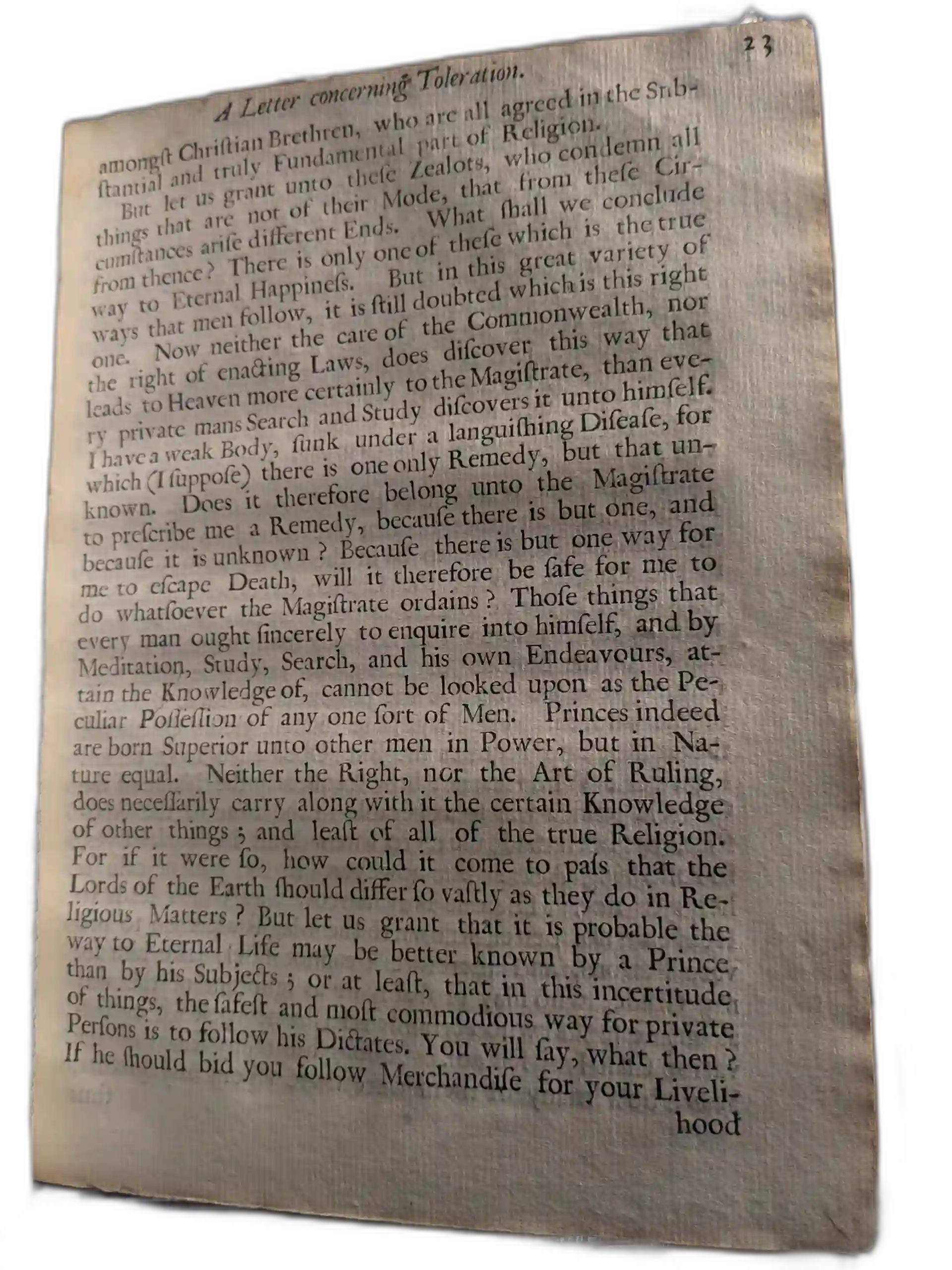
[23]
amongst Christian Brethren, who are all agreed in the Sub-
stantial and truly Fundamental part of Religion.
But let us grant unto these Zealots, who condemn all
things that are not of their Mode, that from these Cir-
cumstances arise different Ends. What shall we conclude
from thence? There is only one of these which is the true
way to Eternal Happiness. But in this great variety of
ways that men follow, it is still doubted which is this right
one. Now neither the care of the Commonwealth, nor
the right of enacting Laws, does discover this way that
leads to Heaven more certainly to the Magistrate, than eve-
ry private mans Search and Study discovers it unto himself.
I have a weak Body, sunk under a languishing Disease, for
which (I suppose) there is one only Remedy, but that un-
known. Does it therefore belong unto the Magistrate
to prescribe me a Remedy, because there is but one, and
because it is unknown? Because there is but one way for
me to escape Death, will it therefore be safe for me to
do whatsoever the Magistrate ordains? Those things that
every man ought sincerely to enquire into himself, and by
Meditation, Study, Search, and his own Endeavours, at-
tain the Knowledge of, cannot be looked upon as the Pe-
culiar Possession of any one sort of Men. Princes indeed
are born Superior unto other men in Power, but in Na-
ture equal. Neither the Right, nor the Art of Ruling,
does necessarily carry along with it the certain Knowledge
of other things; and least of all of the true Religion.
For if it were so, how could it come to pass that the
Lords of the Earth should differ so vastly as they do in Re-
ligious Matters? But let us grant that it is probable the
way to Eternal Life may be better known by a Prince
than by his Subjects; or at least, that in this incertitude
of things, the safest and most commodious way for private
Persons is to follow his Dictates. You will say, what then?
If he should bid you follow Merchandise for your Liveli-

[24]
hood, would you decline that Course for fear it should
not succeed? I answer: I would turn Merchant upon the
Princes command, because in case I should have ill Success
in Trade, he is abundantly able to make up my Loss some
other way. If it be true, as he pretends, that he desires
I should thrive and grow rich, he can set me up a-
gain when unsuccessful Voyages have broke me. But this
is not the Case, in the things that regard the Life to come.
If there I take a wrong Course, if in that respect I am
once undone, it is not in the Magistrates Power to re-
pair my Loss, to ease my Suffering, nor to restore me
in any measure, much less entirely, to a good Estate.
What Security can be given for the Kingdom of Hea-
ven?
Perhaps some will say that they do not suppose this in-
fallible Judgment, that all men are bound to follow in
the Affairs of Religion, to be in the Civil Magistrate, but
in the Church. What the Church has determined, that
the Civil Magistrate orders to be observed; and he pro-
vides by his Authority that no body shall either act or be-
lieve, in the business of Religion, otherwise than the
Church teaches. So that the Judgment of those things is
in the Church. The Magistrate himself yields Obedience
thereunto, and requires the like Obedience from others.
I answer: Who sees not how frequently the Name of the
Church, which was so venerable in the time of the Apo-
stles, has been made use of to throw Dust in Peoples Eyes,
in following Ages? But however, in the present case it
helps us not. The one only narrow way which leads to
Heaven is not better known to the Magistrate than to pri-
vate Persons, and therefore I cannot safely take him for
my Guide, who may probably be as ignorant of the way
as my self, and who certainly is less concerned for my Sal-
vation than I my self am. Amongst so many Kings of the
Jews, how many of them were there whom any Israelite,
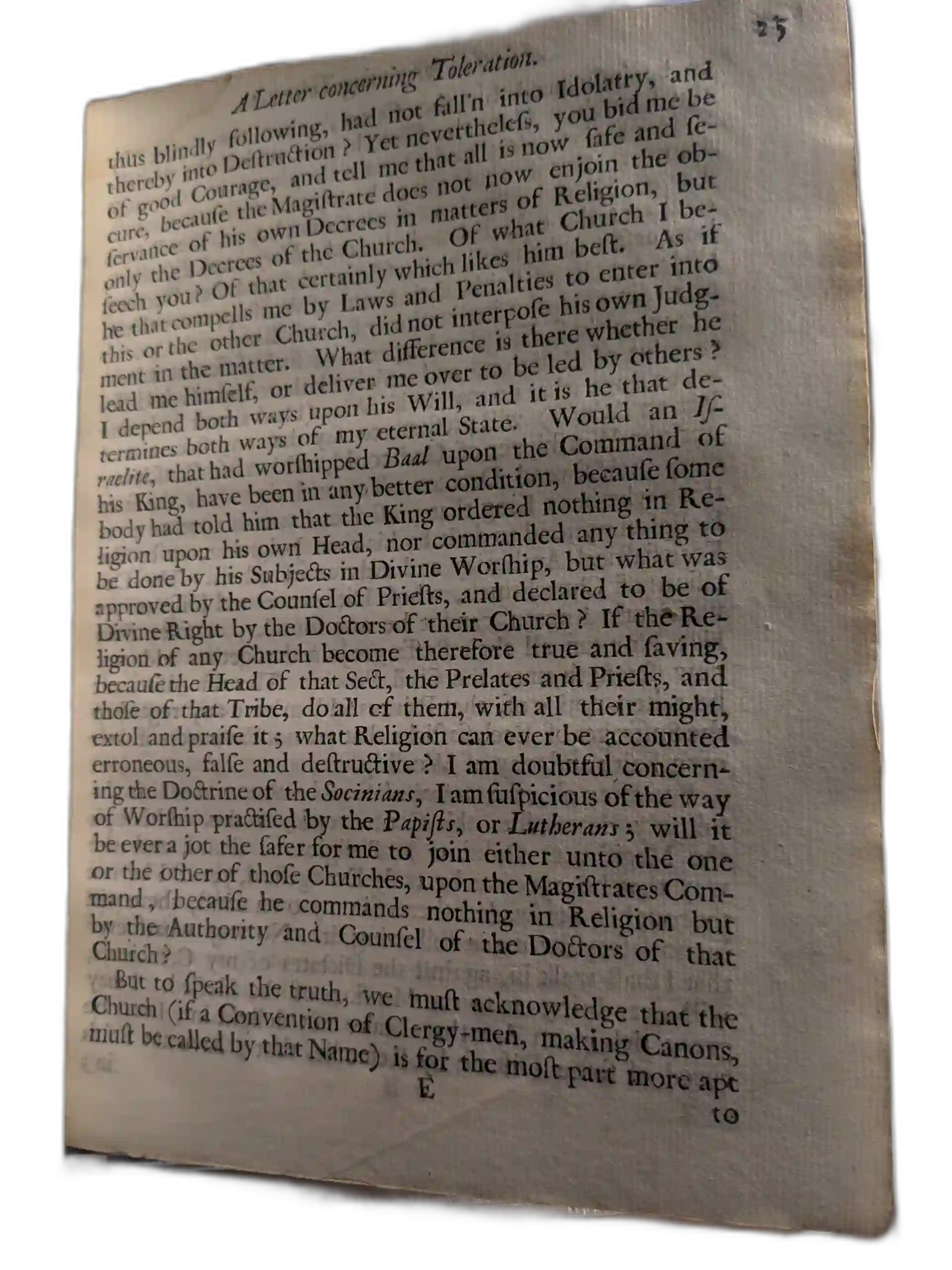
[25]
thus blindly following, had not fall’n into Idolatry, and
thereby into Destruction? Yet nevertheless, you bid me be
of good Courage, and tell me that all is now safe and se-
cure, because the Magistrate does not now enjoin the ob-
servance of his own Decrees in matters of Religion, but
only the Decrees of the Church. Of what Church I be-
seech you? Of that certainly which likes him best. As if
he that compells me by Laws and Penalties to enter into
this or the other Church, did not interpose his own Judg-
ment in the matter. What difference is there whether he
lead me himself, or deliver me over to be led by others?
I depend both ways upon his Will, and it is he that de-
termines both ways of my eternal State. Would an Is-
raelite, that had worshipped Baal upon the Command of
his King, have been in any better condition, because some
body had told him that the King ordered nothing in Re-
ligion upon his own Head, nor commanded any thing to
be done by his Subjects in Divine Worship, but what was
approved by the Counsel of Priests, and declared to be of
Divine Right by the Doctors of their Church? If the Re-
ligion of any Church become therefore true and saving,
because the Head of that Sect, the Prelates and Priests, and
those of that Tribe, do all of them, with all their might,
extol and praise it; what Religion can ever be accounted
erroneous, false and destructive? I am doubtful concern-
ing the Doctrine of the Socinians, I am suspicious of the way
of Worship practised by the Papists, or Lutherans; will it
be ever a jot the safer for me to join either unto the one
or the other of those Churches, upon the Magistrates Com-
mand, because he commands nothing in Religion but
by the Authority and Counsel of the Doctors of that
Church?
But to speak the truth, we must acknowledge that the
Church (if a Convention of Clergy-men, making Canons,
must be called by that Name) is for the most part more apt
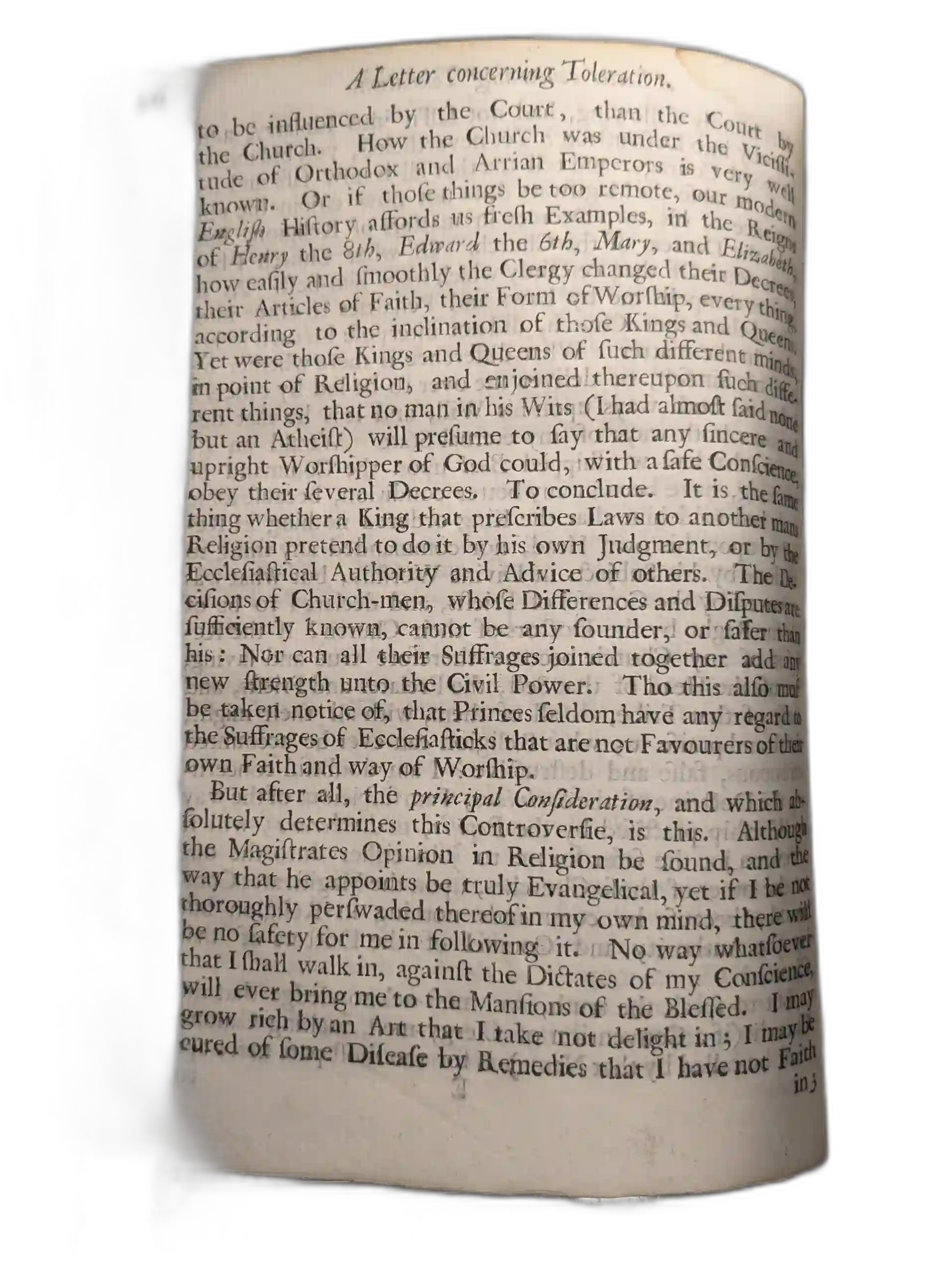
[26]
to be influenced by the Court, than the Court by
the Church. How the Church was under the Vicissi-
tude of Orthodox and Arrian Emperors is very well
known. Or if those things be too remote, our modern
English History affords us fresh Examples, in the Reigns
of Henry the 8th, Edward the 6th, Mary, and Elizabeth,
how easily and smoothly the Clergy changed their Decrees,
their Articles of Faith, their Form of Worship, every thing,
according to the inclination of those Kings and Queens.
Yet were those Kings and Queens of such different minds,
in point of Religion, and enjoined thereupon such diffe-
rent things, that no man in his Wits (I had almost said none
but an Atheist) will presume to say that any sincere and
upright Worshipper of God could, with a safe Conscience,
obey their several Decrees. To conclude. It is the same
thing whether a King that prescribes Laws to another mans
Religion pretend to do it by his own Judgment, or by the
Ecclesiastical Authority and Advice of others. The De-
cisions of Church-men, whose Differences and Disputes are
sufficiently known, cannot be any sounder, or safer than
his: Nor can all their Suffrages joined together add any
new strength unto the Civil Power. Tho this also must
be taken notice of, that Princes seldom have any regard to
the Suffrages of Ecclesiasticks that are not Favourers of their
own Faith and way of Worship.
But after all, the principal Consideration, and which ab-
solutely determines this Controversie, is this. Although
the Magistrates Opinion in Religion be sound, and the
way that he appoints be truly Evangelical, yet if I be not
thoroughly perswaded thereof in my own mind, there will
be no safety for me in following it. No way whatsoever
that I shall walk in, against the Dictates of my Conscience,
will ever bring me to the Mansions of the Blessed. I may
grow rich by an Art that I take not delight in; I may be
cured of some Disease by Remedies that I have not Faith
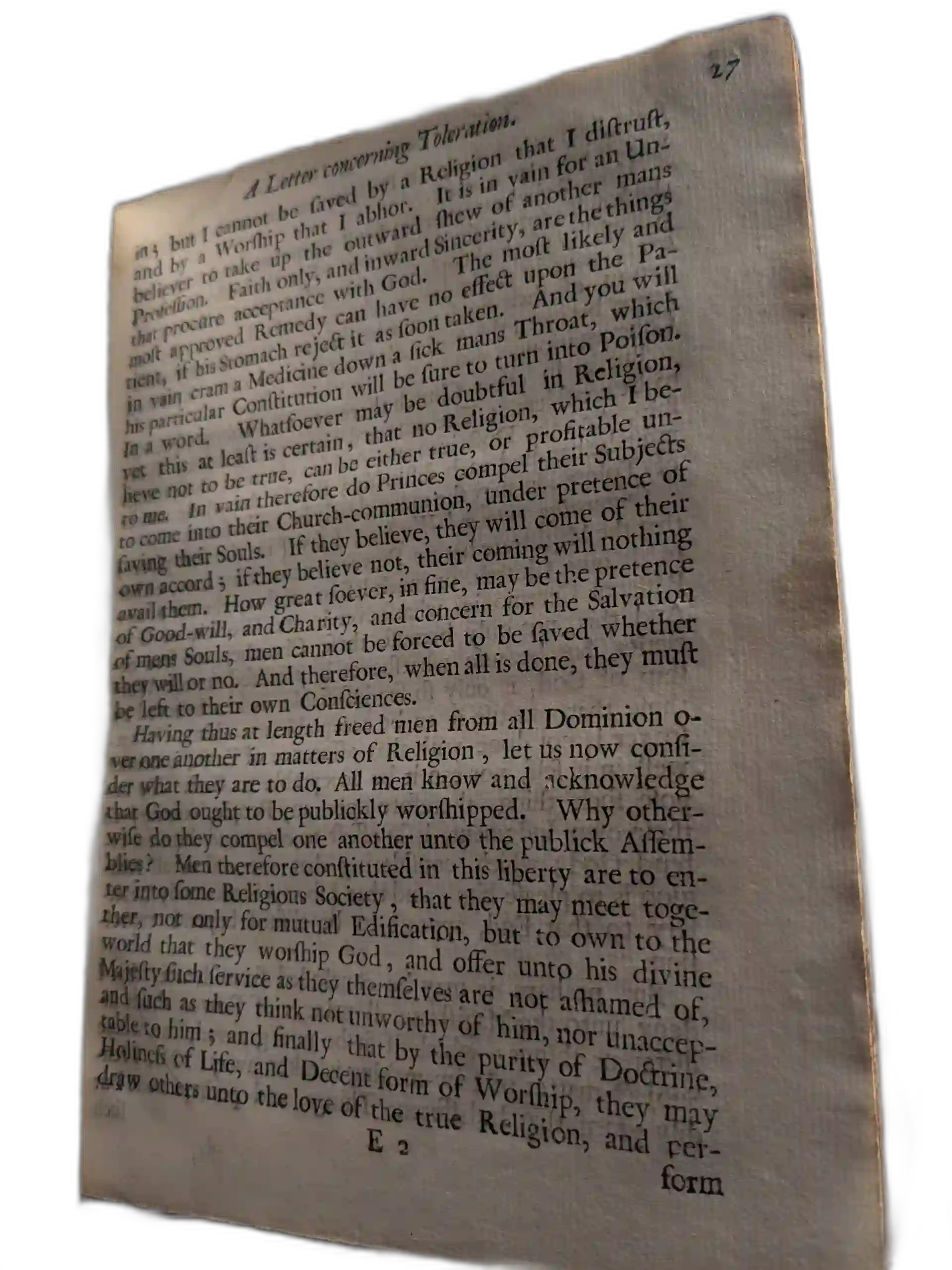
[27]
in; but I cannot be saved by a Religion that I distrust,
and by a Worship that I abhor. It is in vain for an Un-
believer to take up the outward shew of another mans
Profession. Faith only, and inward Sincerity, are the things
that procure acceptance with God. The most likely and
most approved Remedy can have no effect upon the Pa-
tient, if his Stomach reject it as soon taken. And you will
in vain cram a Medicine down a sick mans Throat, which
his particular Constitution will be sure to turn into Poison.
In a word. Whatsoever may be doubtful in Religion,
yet this at least is certain, that no Religion, which I be-
lieve not to be true, can be either true, or profitable un-
to me. In vain therefore do Princes compel their Subjects
to come into their Church-communion, under pretence of
saving their Souls. If they believe, they will come of their
own accord; if they believe not, their coming will nothing
avail them. How great soever, in fine, may be the pretence
of Good-will, and Charity, and concern for the Salvation
of mens Souls, men cannot be forced to be saved whether
they will or no. And therefore, when all is done, they must
be left to their own Consciences.
Having thus at length freed men from all Dominion o-
ver one another in matters of Religion, let us now consi-
der what they are to do. All men know and acknowledge
that God ought to be publickly worshipped. Why other-
wise do they compel one another unto the publick Assem-
blies? Men therefore constituted in this liberty are to en-
ter into some Religious Society, that they may meet toge-
ther, not only for mutual Edification, but to own to the
world that they worship God, and offer unto his divine
Majesty such service as they themselves are not ashamed of,
and such as they think not unworthy of him, nor unaccep-
table to him; and finally that by the purity of Doctrine,
Holiness of Life, and Decent form of Worship, they may
draw others unto the love of the true Religion, and per-

[28]
form such other things in Religion as cannot be done by
each private man apart.
These Religious Societies I call Churches: and these I say
the Magistrate ought to tolerate. For the business of these
Assemblies of the People is nothing but what is lawful for
every man in particular to take care of; I mean the Sal-
vation of their Souls: nor in this case is there any diffe-
rence between the National Church, and other separated
Congregations.
But as in every Church there are two things especially
to be considered; The outward Form and Rites of Wor-
ship, And the Doctrines and Articles of Faith; these things
must be handled each distinctly; that so the whole matter
of Toleration may the more clearly be understood.
Concerning outward Worship, I say (in the first place)
that the Magistrate has no Power to enforce by Law, either
in his own Church, or much less in another, the use of any
Rites or Ceremonies whatsoever in the Worship of God.
And this, not only because these Churches are free So-
cieties, but because whatsoever is practised in the Wor-
ship of God, is only so far justifiable as it is believed by
those that practise it to be acceptable unto him. What-
soever is not done with that assurance of Faith, is neither
well in it self, nor can it be acceptable to God. To im-
pose such things therefore upon any People, contrary to
their own Judgment, is in effect to command them to of-
fend God; which, considering that the end of all Reli-
gion is to please him, and that Liberty is essentially neces-
sary to that End, appears to be absurd beyond expres-
sion.
But perhaps it may be concluded from hence, that I
deny unto the Magistrate all manner of Power about in-
different things; which if it be not granted, the whole
Subject-matter of Law-making is taken away. No, I rea-
dily grant that Indifferent Things, and perhaps none but
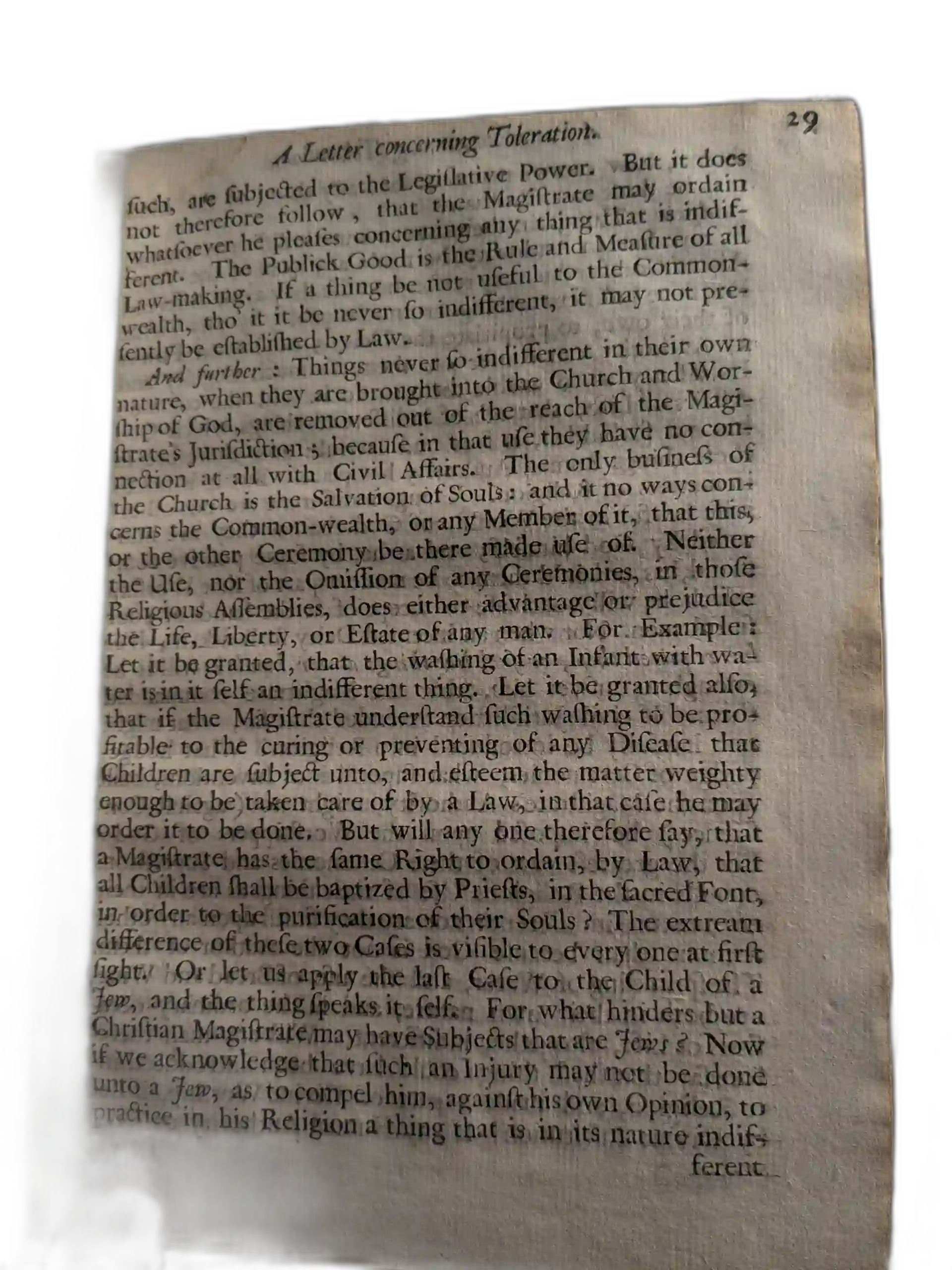
[29]
such, are subjected to the Legislative Power. But it does
not therefore follow, that the Magistrate may ordain
whatsoever he pleases concerning any thing that is indif-
ferent. The Publick Good is the Rule and Measure of all
Law-making. If a thing be not useful to the Common-
wealth, tho’ it it be never so indifferent, it may not pre-
sently be established by Law.
And further: Things never so indifferent in their own
nature, when they are brought into the Church and Wor-
ship of God, are removed out of the reach of the Magi-
strate’s Jurisdiction; because in that use they have no con-
nection at all with Civil Affairs. The only business of
the Church is the Salvation of Souls: and it no ways con-
cerns the Common-wealth, or any Member of it, that this,
or the other Ceremony be there made use of. Neither
the Use, nor the Omission of any Ceremonies, in those
Religious Assemblies, does either advantage or prejudice
the Life, Liberty, or Estate of any man. For Example:
Let it be granted, that the washing of an Infant with wa-
ter is in it self an indifferent thing. Let it be granted also,
that if the Magistrate understand such washing to be pro-
fitable to the curing or preventing of any Disease that
Children are subject unto, and esteem the matter weighty
enough to be taken care of by a Law, in that case he may
order it to be done. But will any one therefore say, that
a Magistrate has the same Right to ordain, by Law, that
all Children shall be baptized by Priests, in the sacred Font,
in order to the purification of their Souls? The extream
difference of these two Cases is visible to every one at first
sight. Or let us apply the last Case to the Child of a
Jew, and the thing speaks it self. For what hinders but a
Christian Magistrate may have Subjects that are Jews? Now
if we acknowledge that such an Injury may not be done
unto a Jew, as to compel him, against his own Opinion, to
practice in his Religion a thing that is in its nature indif-
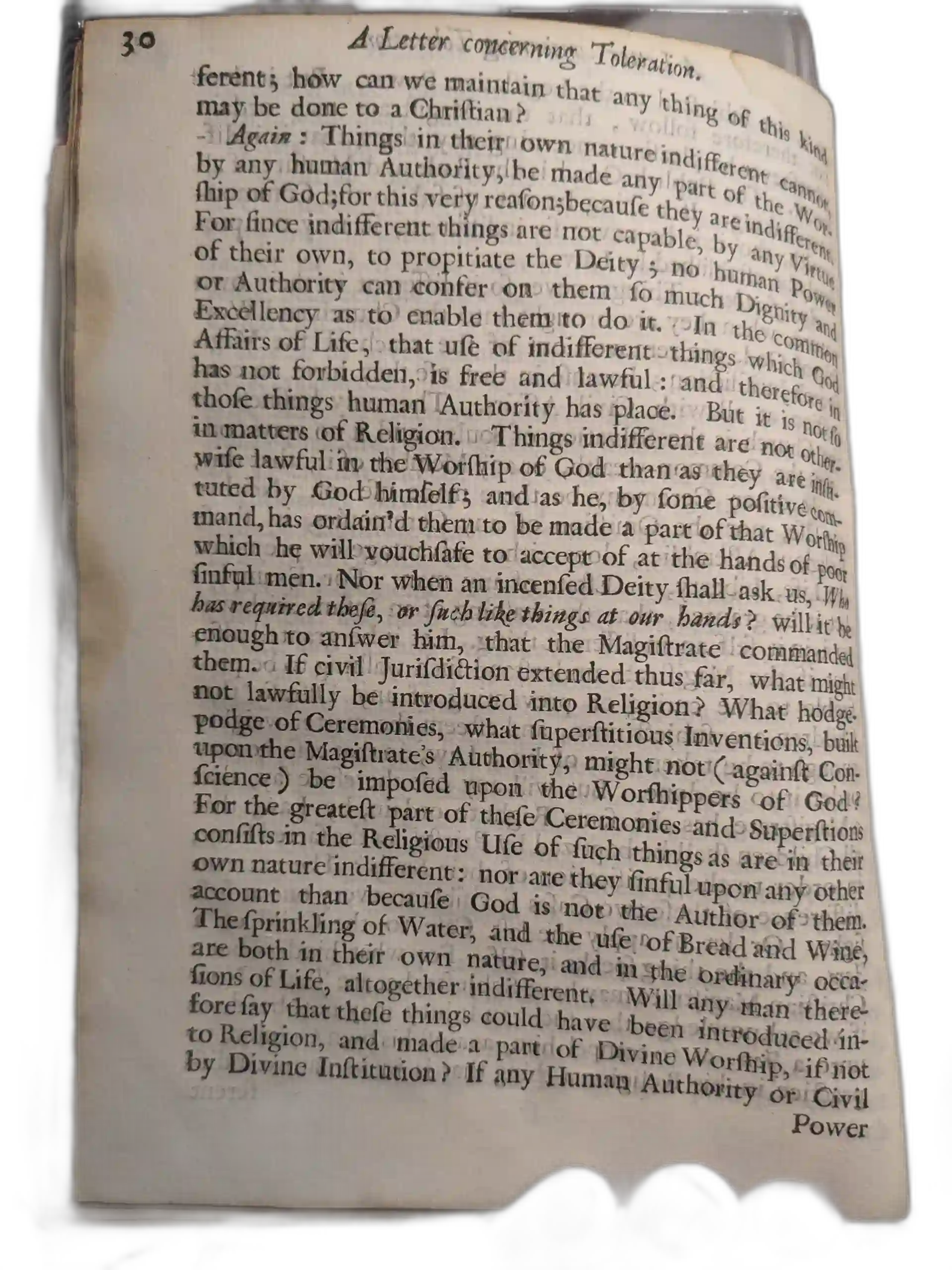
[30]
ferent; how can we maintain that any thing of this kind
may be done to a Christian?
Again: Things in their own nature indifferent cannot,
by any human Authority, be made any part of the Wor-
ship of God; for this very reason; because they are indifferent.
For since indifferent things are not capable, by any Virtue
of their own, to propitiate the Deity; no human Power
or Authority can confer on them so much Dignity and
Excellency as to enable them to do it. In the common
Affairs of Life, that use of indifferent things which God
has not forbidden, is free and lawful: and therefore in
those things human Authority has place. But it is not so
in matters of Religion. Things indifferent are not other-
wise lawful in the Worship of God than as they are insti-
tuted by God himself; and as he, by some positive com-
mand, has ordain’d them to be made a part of that Worship
which he will vouchsafe to accept of at the hands of poor
sinful men. Nor when an incensed Deity shall ask us, Who
has required these, or such like things at our hands? will it be
enough to answer him, that the Magistrate commanded
them. If civil Jurisdiction extended thus far, what might
not lawfully be introduced into Religion? What hodge-
podge of Ceremonies, what superstitious Inventions, built
upon the Magistrate’s Authority, might not (against Con-
science) be imposed upon the Worshippers of God?
For the greatest part of these Ceremonies and Superstions
consists in the Religious Use of such things as are in their
own nature indifferent: nor are they sinful upon any other
account than because God is not the Author of them.
The sprinkling of Water, and the use of Bread and Wine,
are both in their own nature, and in the ordinary occa-
sions of Life, altogether indifferent. Will any man there-
fore say that these things could have been introduced in-
to Religion, and made a part of Divine Worship, if not
by Divine Institution? If any Human Authority or Civil
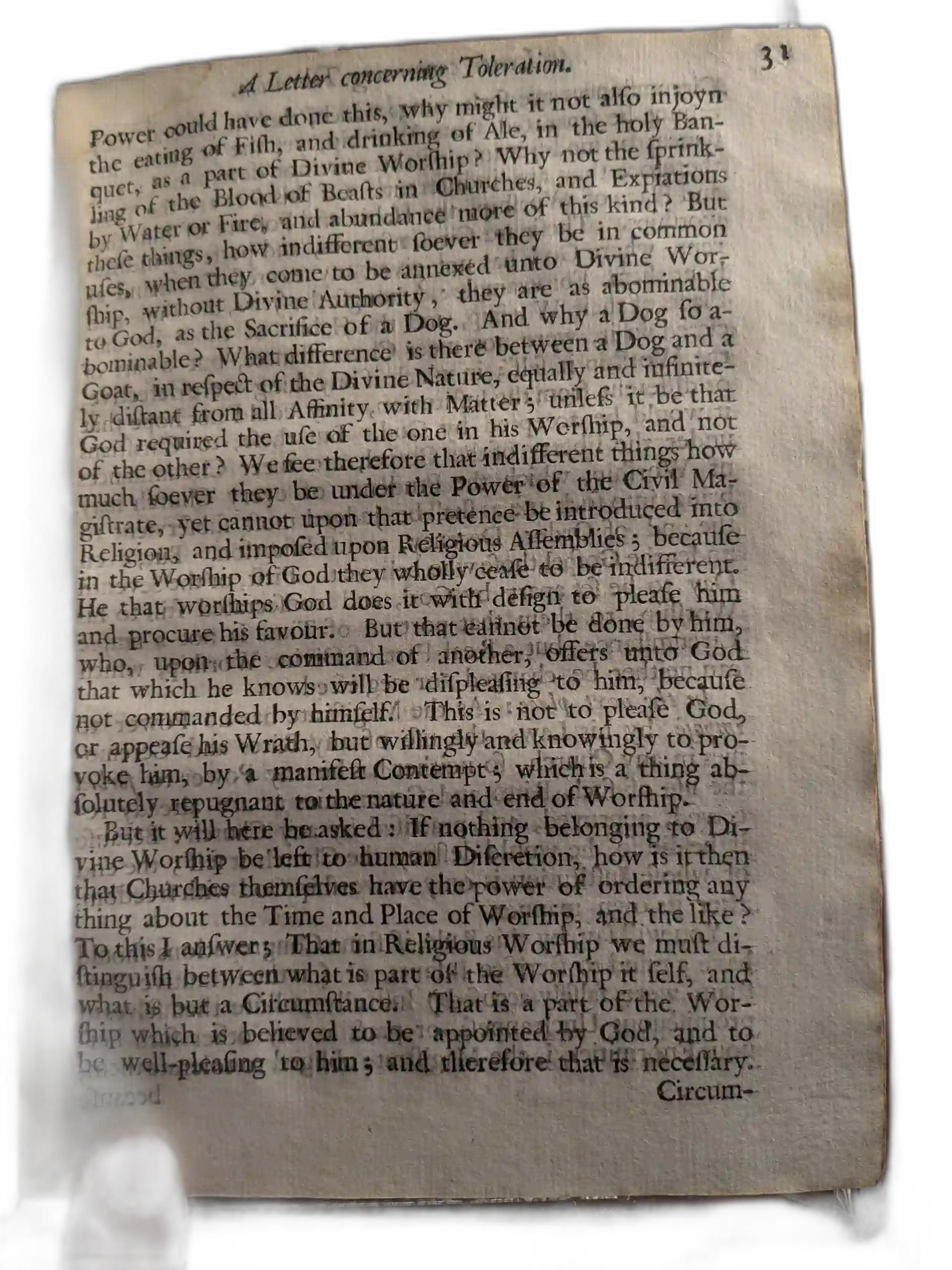
[31]
Power could have done this, why might it not also injoyn
the eating of Fish, and drinking of Ale, in the holy Ban-
quet, as a part of Divine Worship? Why not the sprink-
ling of the Blood of Beasts in Churches, and Expiations
by Water or Fire, and abundance more of this kind? But
these things, how indifferent soever they be in common
uses, when they come to be annexed unto Divine Wor-
ship, without Divine Authority, they are as abominable
to God, as the Sacrifice of a Dog. And why a Dog so a-
bominable? What difference is there between a Dog and a
Goat, in respect of the Divine Nature, equally and infinite-
ly distant from all Affinity with Matter; unless it be that
God required the use of the one in his Worship, and not
of the other? We see therefore that indifferent things how
much soever they be under the Power of the Civil Ma-
gistrate, yet cannot upon that pretence be introduced into
Religion, and imposed upon Religious Assemblies; because
in the Worship of God they wholly cease to be indifferent.
He that worships God does it with design to please him
and procure his favour. But that cannot be done by him,
who, upon the command of another, offers unto God
that which he knows will be displeasing to him, because
not commanded by himself. This is not to please God,
or appease his Wrath, but willingly and knowingly to pro-
voke him, by a manifest Contempt; which is a thing ab-
solutely repugnant to the nature and end of Worship.
But it will here be asked: If nothing belonging to Di-
vine Worship be left to human Discretion, how is it then
that Churches themselves have the power of ordering any
thing about the Time and Place of Worship, and the like?
To this I answer; That in Religious Worship we must di-
stinguish between what is part of the Worship it self, and
what is but a Circumstance. That is a part of the Wor-
ship which is believed to be appointed by God, and to
be well-pleasing to him; and therefore that is necessary.

[32]
Circumstances are such things which, tho’ in general they
cannot be separated from Worship, yet the particular in-
stances or modifications of them are not determined; and
therefore they are indifferent. Of this sort are the Time
and Place of Worship, the Habit and Posture of him that
worships. These are Circumstances, and perfectly indiffe-
rent, where God has not given any express Command a-
bout them. For example: Amongst the Jews, the Time and
Place of their Worship, and the Habits of those that offi-
ciated in it, were not meer Circumstances, but a part of
the Worship it self; in which if any thing were defective,
or different from the Institution, they could not hope that
it would be accepted by God. But these, to Christians
under the liberty of the Gospel, are meer Circumstances
of Worship, which the Prudence of every Church may
bring into such use as shall be judged most subservient to
the end of Order, Decency, and Edification. But, even
under the Gospel, those who believe the First, or the Seventh
Day to be set apart by God, and consecrated still to his
Worship, to them that portion of Time is not a simple
Circumstance, but a Real Part of Divine Worship, which
can neither be changed nor neglected.
In the next place: As the Magistrate has no Power to
impose by his Laws, the use of any Rites and Ceremo-
nies in any Church, so neither has he any Power to forbid
the use of such Rites and Ceremonies as are already re-
ceived, approved, and practised by any Church: Because
if he did so, he would destroy the Church it self; the end
of whose Institution is only to worship God with freedom,
after its own manner.
You will say, by this Rule, if some Congregations should
have a mind to sacrifice Infants, or (as the Primitive Chri-
stians were falsely accused) lustfully pollute themselves in
promiscuous Uncleanness, or practise any other such hei-
nous Enormities, is the Magistrate obliged to tolerate them,

[33]
because they are committed in a Religious Assembly? I
answer, No. These things are not lawful in the ordinary
course of life, nor in any private house; and therefore
neither are they so in the Worship of God, or in any reli-
gious Meeting. But indeed if any People congregated up-
on account of Religion, should be desirous to sacrifice a
Calf, I deny that That ought to be prohibited by a Law.
Melibæus, whose Calf it is, may lawfully kill his Calf
at home, and burn any part of it that he thinks fit. For
no Injury is thereby done to any one, no prejudice to an-
other mans Goods. And for the same reason he may kill
his Calf also in a religious Meeting. Whether the doing
so be well-pleasing to God or no, it is their part to con-
sider that do it. The part of the Magistrate is only to take
care that the Commonwealth receive no prejudice, and
that there be no Injury done to any man, either in Life or
Estate. And thus what may be spent on a Feast, may be
spent on a Sacrifice. But if peradventure such were the
state of things, that the Interest of the Commonwealth re-
quired all slaughter of Beasts should be forborn for some
while, in order to the increasing of the stock of Cattel,
that had been destroyed by some extraordinary Murrain;
Who sees not that the Magistrate, in such a case, may forbid
all his Subjects to kill any Calves for any use whatsoever?
Only ’tis to be observed, that in this case the Law is not
made about a Religious, but a Political matter: nor is the
Sacrifice, but the Slaughter of Calves thereby prohibited.
By this we see what difference there is between the
Church and the Commonwealth. Whatsoever is lawful
in the Commonwealth, cannot be prohibited by the Ma-
gistrate in the Church. Whatsoever is permitted unto any of
his Subjects for their ordinary use, neither can nor ought
to be forbidden by him to any Sect of People for their re-
ligious Uses. If any man may lawfully take Bread or Wine,
either sitting or kneeling, in his own house, the Law ought
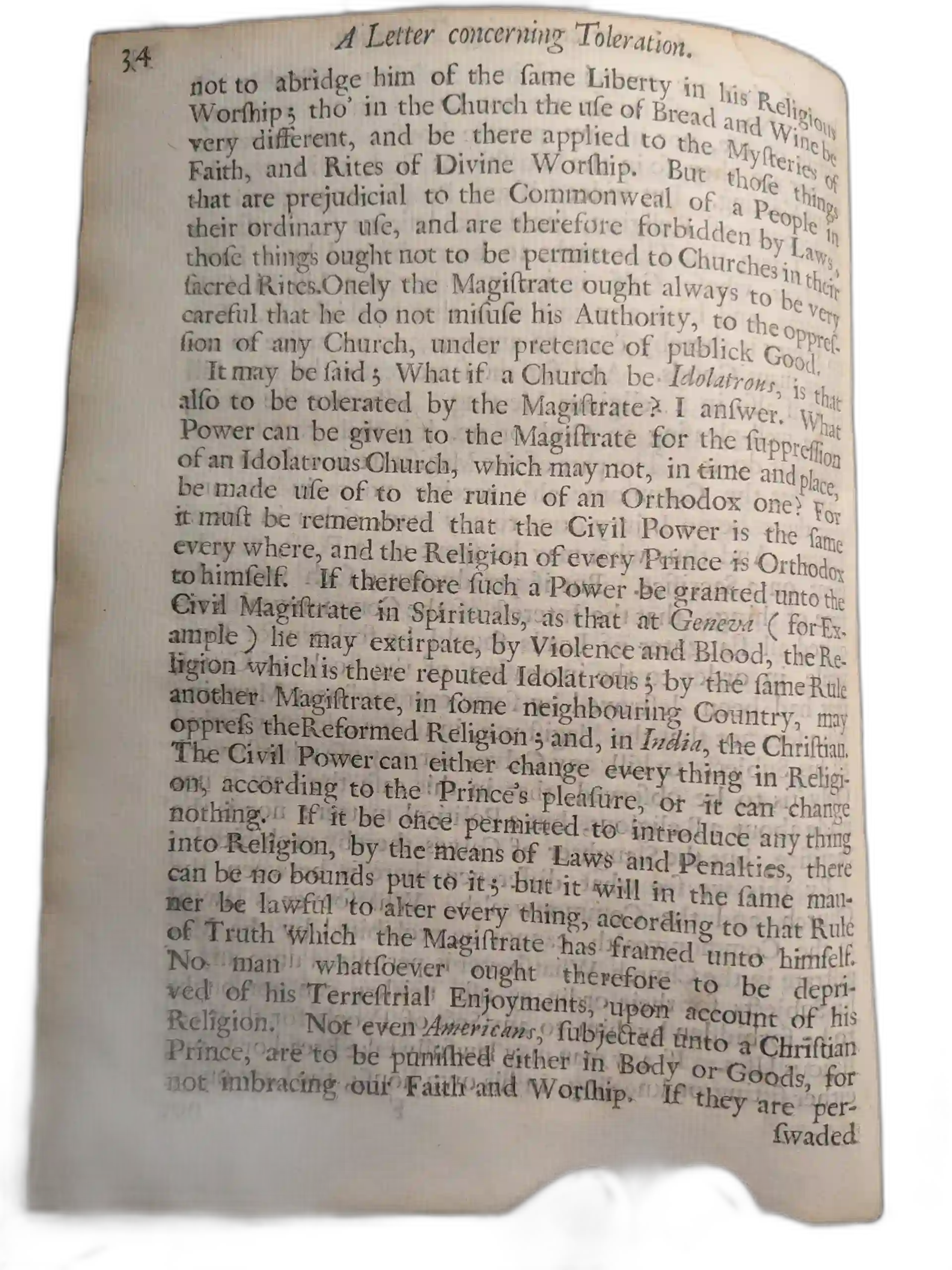
[34]
not to abridge him of the same Liberty in his Religious
Worship; tho’ in the Church the use of Bread and Wine be
very different, and be there applied to the Mysteries of
Faith, and Rites of Divine Worship. But those things
that are prejudicial to the Commonweal of a People in
their ordinary use, and are therefore forbidden by Laws,
those things ought not to be permitted to Churches in their
sacred Rites. Onely the Magistrate ought always to be very
careful that he do not misuse his Authority, to the oppres-
sion of any Church, under pretence of publick Good.
It may be said; What if a Church be Idolatrous, is that
also to be tolerated by the Magistrate? I answer. What
Power can be given to the Magistrate for the suppression
of an Idolatrous Church, which may not, in time and place,
be made use of to the ruine of an Orthodox one? For
it must be remembred that the Civil Power is the same
every where, and the Religion of every Prince is Orthodox
to himself. If therefore such a Power be granted unto the
Civil Magistrate in Spirituals, as that at Geneva (for Ex-
ample) he may extirpate, by Violence and Blood, the Re-
ligion which is there reputed Idolatrous; by the same Rule
another Magistrate, in some neighbouring Country, may
oppress the Reformed Religion; and, in India, the Christian.
The Civil Power can either change every thing in Religi-
on, according to the Prince’s pleasure, or it can change
nothing. If it be once permitted to introduce any thing
into Religion, by the means of Laws and Penalties, there
can be no bounds put to it; but it will in the same man-
ner be lawful to alter every thing, according to that Rule
of Truth which the Magistrate has framed unto himself.
No man whatsoever ought therefore to be depri-
ved of his Terrestrial Enjoyments, upon account of his
Religion. Not even Americans, subjected unto a Christian
Prince, are to be punished either in Body or Goods, for
not imbracing our Faith and Worship. If they are per-
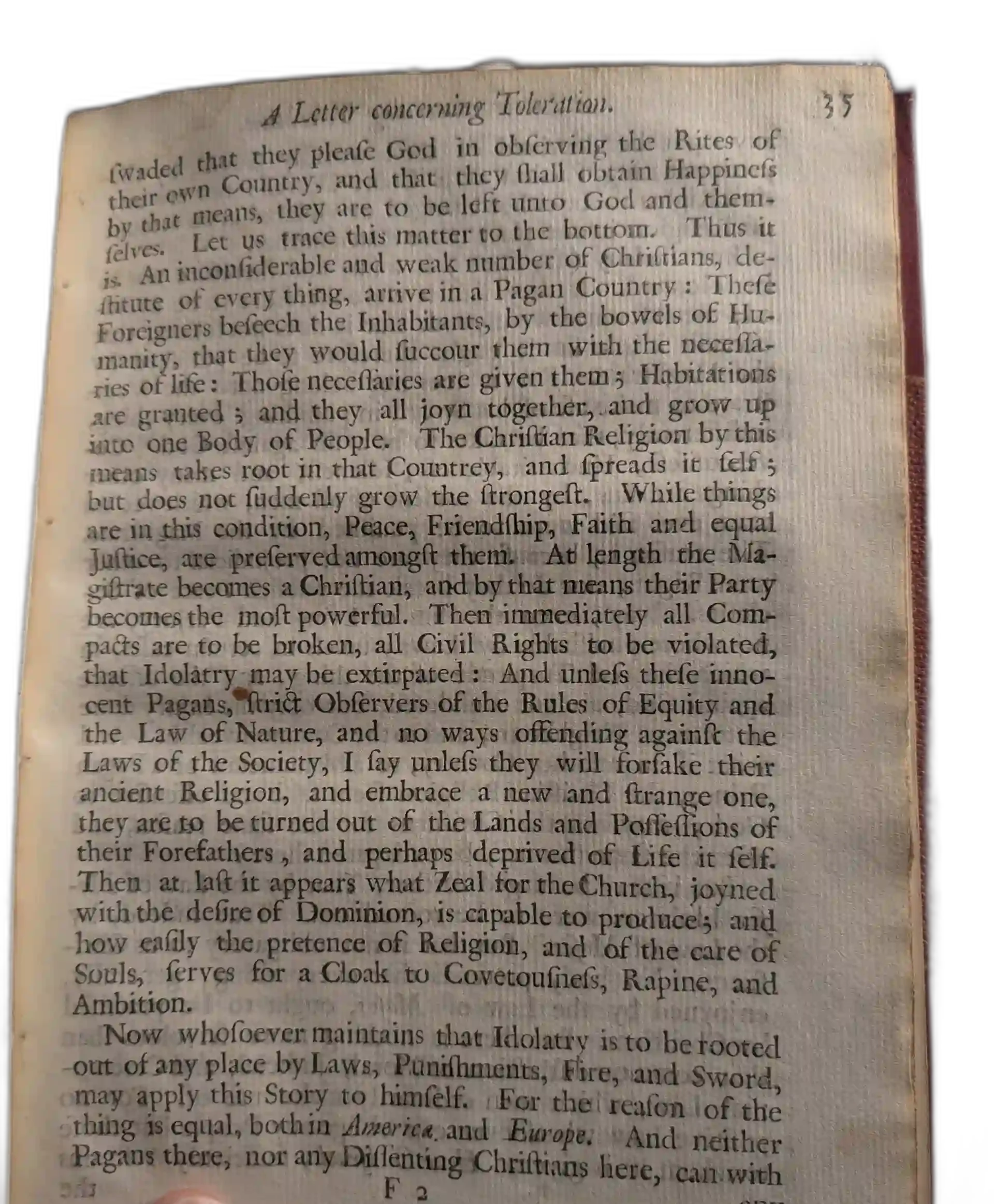
[35]
swaded that they please God in observing the Rites of
their own Country, and that they shall obtain Happiness
by that means, they are to be left unto God and them-
selves. Let us trace this matter to the bottom. Thus it
is. An inconsiderable and weak number of Christians, de-
stitute of every thing, arrive in a Pagan Country: These
Foreigners beseech the Inhabitants, by the bowels of Hu-
manity, that they would succour them with the necessa-
ries of life: Those necessaries are given them; Habitations
are granted; and they all joyn together, and grow up
into one Body of People. The Christian Religion by this
means takes root in that Countrey, and spreads it self;
but does not suddenly grow the strongest. While things
are in this condition, Peace, Friendship, Faith and equal
Justice, are preserved amongst them. At length the Ma-
gistrate becomes a Christian, and by that means their Party
becomes the most powerful. Then immediately all Com-
pacts are to be broken, all Civil Rights to be violated,
that Idolatry may be extirpated: And unless these inno-
cent Pagans, strict Observers of the Rules of Equity and
the Law of Nature, and no ways offending against the
Laws of the Society, I say unless they will forsake their
ancient Religion, and embrace a new and strange one,
they are to be turned out of the Lands and Possessions of
their Forefathers, and perhaps deprived of Life it self.
Then at last it appears what Zeal for the Church, joyned
with the desire of Dominion, is capable to produce; and
how easily the pretence of Religion, and of the care of
Souls, serves for a Cloak to Covetousness, Rapine, and
Ambition.
Now whosoever maintains that Idolatry is to be rooted
out of any place by Laws, Punishments, Fire, and Sword,
may apply this Story to himself. For the reason of the
thing is equal, both in America and Europe. And neither
Pagans there, nor any Dissenting Christians here, can with
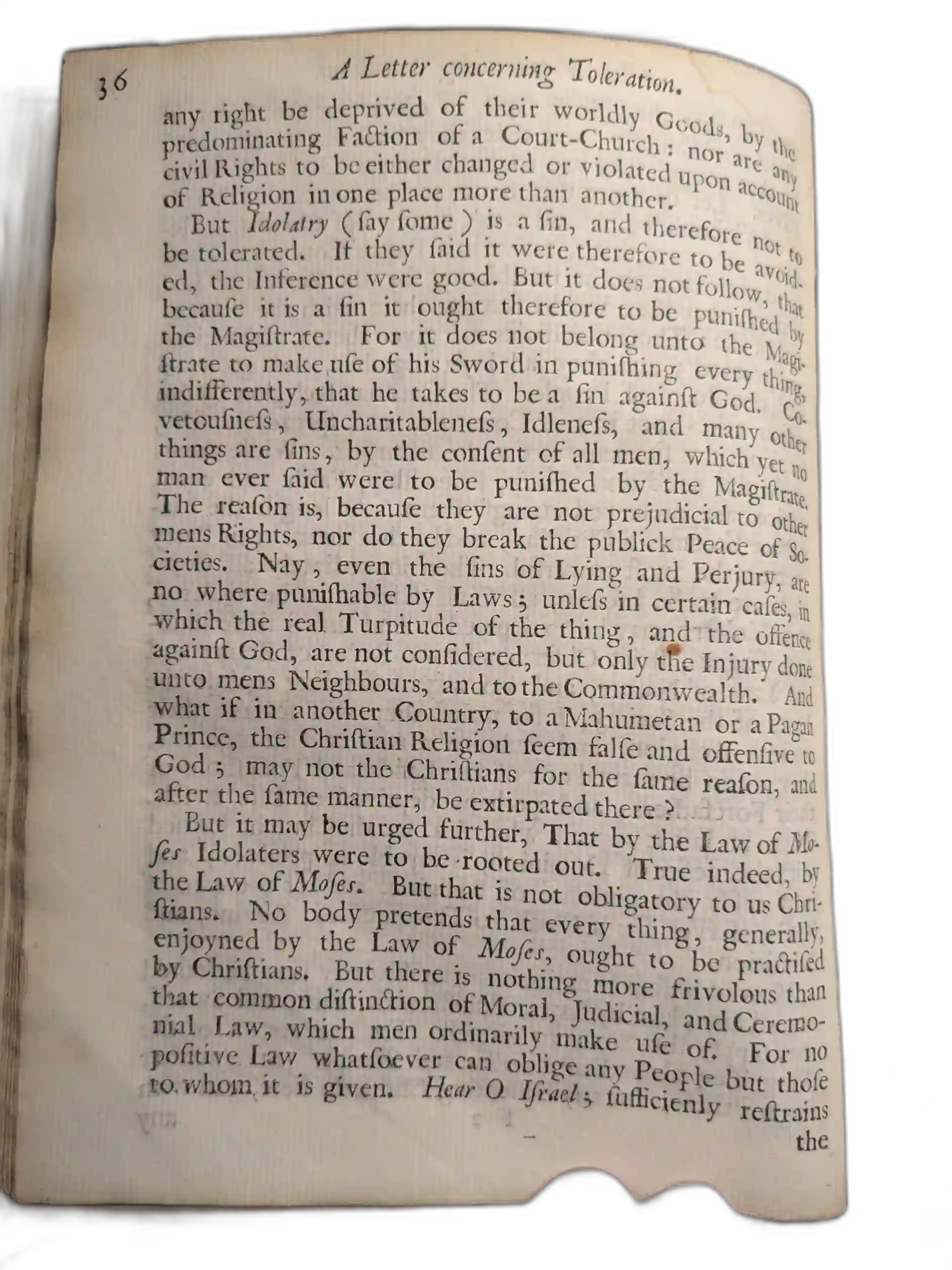
[36]
any right be deprived of their worldly Goods, by the
predominating Faction of a Court-Church: nor are any
civil Rights to be either changed or violated upon account
of Religion in one place more than another.
But Idolatry (say some) is a sin, and therefore not to
be tolerated. If they said it were therefore to be avoid-
ed, the Inference were good. But it does not follow, that
because it is a sin it ought therefore to be punished by
the Magistrate. For it does not belong unto the Magi-
strate to make use of his Sword in punishing every thing,
indifferently, that he takes to be a sin against God. Co-
vetousness, Uncharitableness, Idleness, and many other
things are sins, by the consent of all men, which yet no
man ever said were to be punished by the Magistrate.
The reason is, because they are not prejudicial to other
mens Rights, nor do they break the publick Peace of So-
cieties. Nay, even the sins of Lying and Perjury, are
no where punishable by Laws; unless in certain cases, in
which the real Turpitude of the thing, and the offence
against God, are not considered, but only the Injury done
unto mens Neighbours, and to the Commonwealth. And
what if in another Country, to a Mahumetan or a Pagan
Prince, the Christian Religion seem false and offensive to
God; may not the Christians for the same reason, and
after the same manner, be extirpated there?
But it may be urged further, That by the Law of Mo-
ses Idolaters were to be rooted out. True indeed, by
the Law of Moses. But that is not obligatory to us Chri-
stians. No body pretends that every thing, generally,
enjoyned by the Law of Moses, ought to be practised
by Christians. But there is nothing more frivolous than
that common distinction of Moral, Judicial, and Ceremo-
nial Law, which men ordinarily make use of. For no
positive Law whatsoever can oblige any People but those
to whom it is given. Hear O Israel; sufficienly restrains
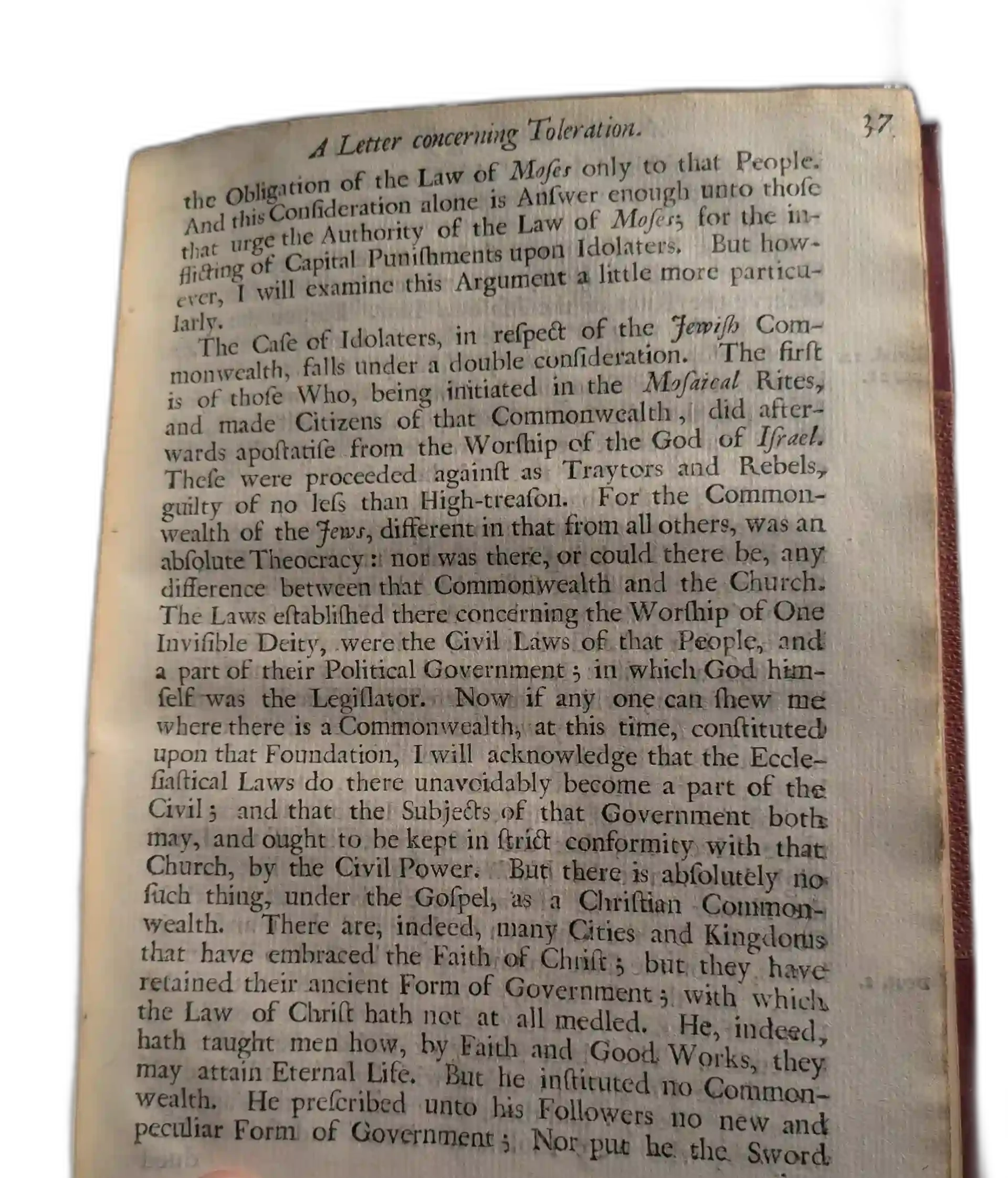
[37]
the Obligation of the Law of Moses only to that People.
And this Consideration alone is Answer enough unto those
that urge the Authority of the Law of Moses; for the in-
flicting of Capital Punishments upon Idolaters. But how-
ever, I will examine this Argument a little more particu-
larly.
The Case of Idolaters, in respect of the Jewish Com-
monwealth, falls under a double consideration. The first
is of those Who, being initiated in the Mosaical Rites,
and made Citizens of that Commonwealth, did after-
wards apostatise from the Worship of the God of Israel.
These were proceeded against as Traytors and Rebels,
guilty of no less than High-treason. For the Common-
wealth of the Jews, different in that from all others, was an
absolute Theocracy: nor was there, or could there be, any
difference between that Commonwealth and the Church.
The Laws established there concerning the Worship of One
Invisible Deity, were the Civil Laws of that People, and
a part of their Political Government; in which God him-
self was the Legislator. Now if any one can shew me
where there is a Commonwealth, at this time, constituted
upon that Foundation, I will acknowledge that the Eccle-
siastical Laws do there unavoidably become a part of the
Civil; and that the Subjects of that Government both
may, and ought to be kept in strict conformity with that
Church, by the Civil Power. But there is absolutely no
such thing, under the Gospel, as a Christian Common-
wealth. There are, indeed, many Cities and Kingdoms
that have embraced the Faith of Christ; but they have
retained their ancient Form of Government; with which
the Law of Christ hath not at all medled. He, indeed,
hath taught men how, by Faith and Good Works, they
may attain Eternal Life. But he instituted no Common-
wealth. He prescribed unto his Followers no new and
peculiar Form of Government; Nor put he the Sword
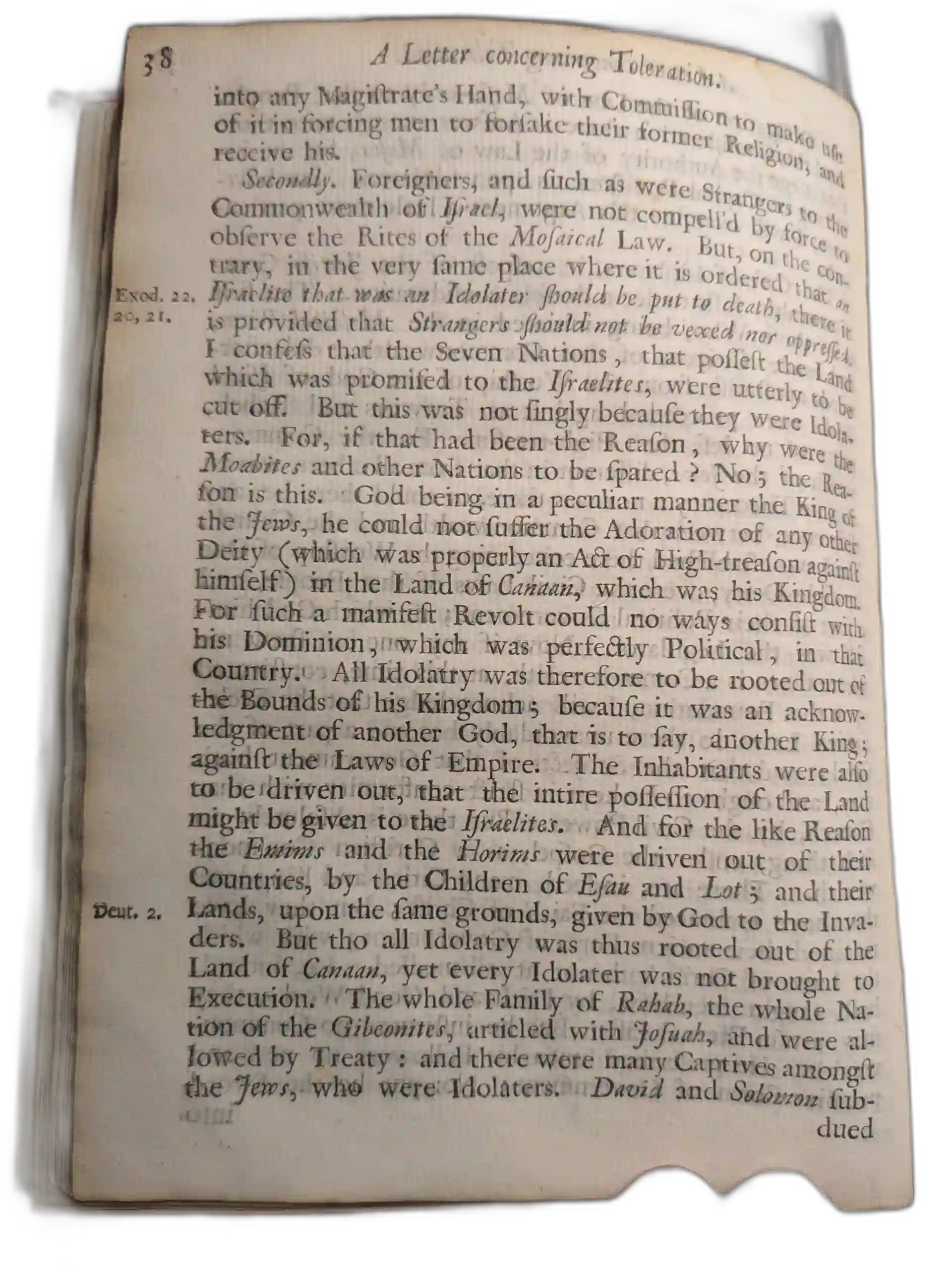
[38]
into any Magistrate’s Hand, with Commission to make use
of it in forcing men to forsake their former Religion, and
receive his.
Secondly. Foreigners, and such as were Strangers to the
Commonwealth of Israel, were not compell’d by force to
observe the Rites of the Mosaical Law. But, on the con-
trary, in the very same place where it is ordered that an
Israelite that was an Idolater should be put to death,*Exod. 22. 20, 21. there it
is provided that Strangers should not be vexed nor oppressed.
I confess that the Seven Nations, that possest the Land
which was promised to the Israelites, were utterly to be
cut off. But this was not singly because they were Idola-
ters. For, if that had been the Reason, why were the
Moabites and other Nations to be spared? No; the Rea-
son is this. God being in a peculiar manner the King of
the Jews, he could not suffer the Adoration of any other
Deity (which was properly an Act of High-treason against
himself) in the Land of Canaan, which was his Kingdom.
For such a manifest Revolt could no ways consist with
his Dominion, which was perfectly Political, in that
Country. All Idolatry was therefore to be rooted out of
the Bounds of his Kingdom; because it was an acknow-
ledgment of another God, that is to say, another King;
against the Laws of Empire. The Inhabitants were also
to be driven out, that the intire possession of the Land
might be given to the Israelites. And for the like Reason
the Emims and the Horims were driven out of their
Countries, by the Children of Esau and Lot; and their
Lands,*Deut. 2. upon the same grounds, given by God to the Inva-
ders. But tho all Idolatry was thus rooted out of the
Land of Canaan, yet every Idolater was not brought to
Execution. The whole Family of Rahab, the whole Na-
tion of the Gibeonites, articled with Josuah, and were al-
lowed by Treaty: and there were many Captives amongst
the Jews, who were Idolaters. David and Solomon sub-

[39]
dued many Countries without the Confines of the Land
of Promise, and carried their Conquests as far as Euphrates.
Amongst so many Captives taken, so many Nations re-
duced under their Obedience, we find not one man forced
into the Jewish Religion, and the Worship of the True
God, and punished for Idolatry, tho all of them were
certainly guilty of it. If any one indeed, becoming a
Proselyte, desired to be made a Denison of their Com-
monwealth, he was obliged to submit unto their Laws;
that is, to embrace their Religion. But this he did wil-
lingly, on his own accord, not by constraint. He did not
unwillingly submit, to shew his Obedience; But he sought
and sollicited for it, as a Privilege. And as soon as he was
admitted, he became subject to the Laws of the Common-
wealth, by which all Idolatry was forbidden within the
Borders of the Land of Canaan. But that Law (as I have
said) did not reach to any of those Regions, however
subjected unto the Jews, that were situated without those
Bounds.
Thus far concerning outward Worship. Let us now
consider Articles of Faith.
The Articles of Religion are some of them Practical, and
some Speculative. Now, tho both sorts consist in the Know-
ledge of Truth, yet these terminate simply in the Under-
standing, Those influence the Will and Manners. Speculative
Opinions, therefore, and Articles of Faith (as they are called)
which are required only to be believed, cannot be imposed
on any Church by the Law of the Land. For it is absurd
that things should be enjoyned by Laws, which are not in
mens power to perform. And to believe this or that to be
true, does not depend upon our Will. But of this enough
has been said already. But (will some say) let men at
least profess that they believe. A sweet Religion indeed,
that obliges men to dissemble, and tell Lies both to God
and Man, for the Salvation of their Souls! If the Magi-
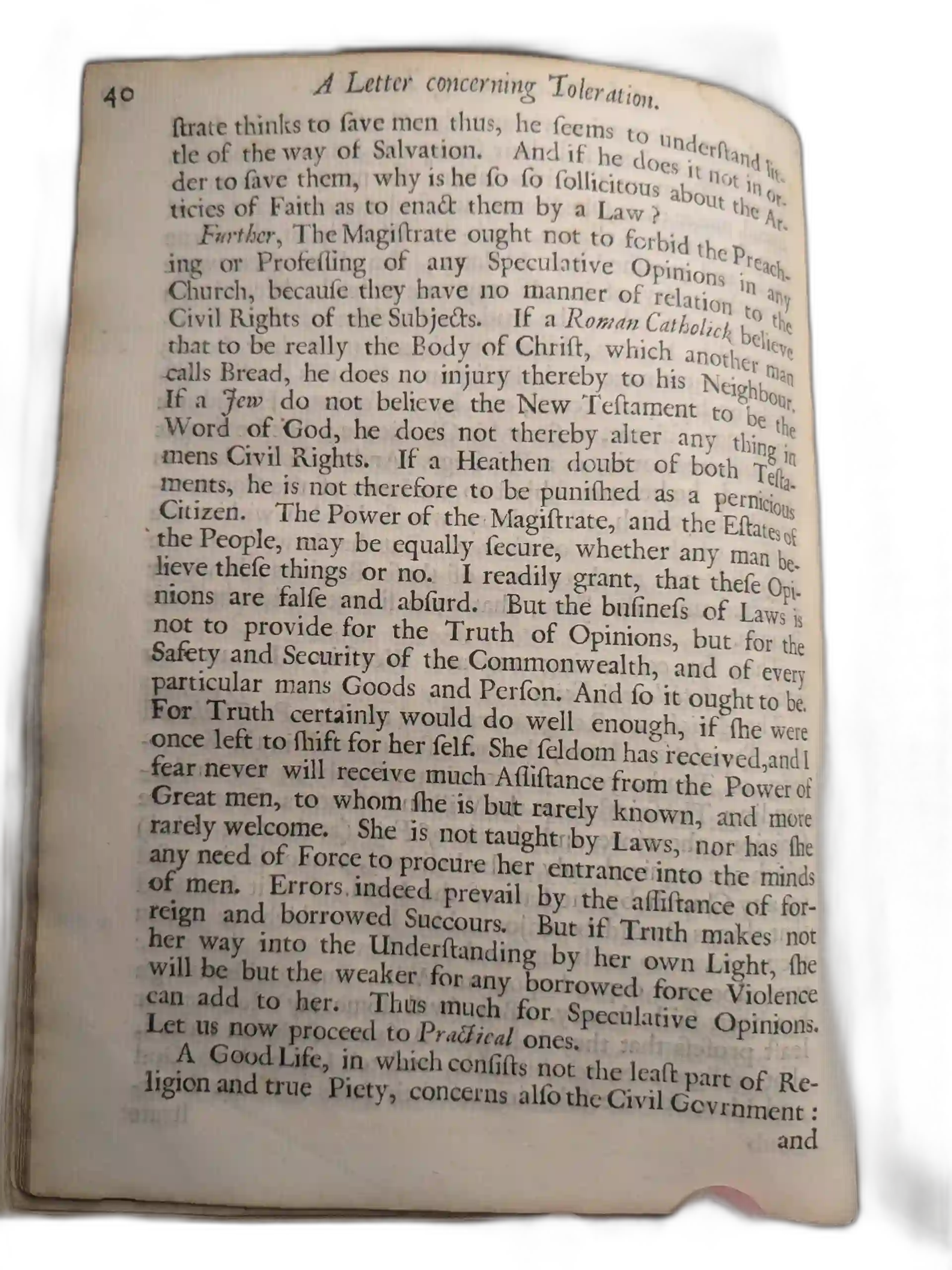
[40]
strate thinks to save men thus, he seems to understand lit-
tle of the way of Salvation. And if he does it not in or-
der to save them, why is he so so sollicitous about the Ar-
ticies of Faith as to enact them by a Law?
Further, The Magistrate ought not to forbid the Preach-
ing or Professing of any Speculative Opinions in any
Church, because they have no manner of relation to the
Civil Rights of the Subjects. If a Roman Catholick believe
that to be really the Body of Christ, which another man
calls Bread, he does no injury thereby to his Neighbour.
If a Jew do not believe the New Testament to be the
Word of God, he does not thereby alter any thing in
mens Civil Rights. If a Heathen doubt of both Testa-
ments, he is not therefore to be punished as a pernicious
Citizen. The Power of the Magistrate, and the Estates of
the People, may be equally secure, whether any man be-
lieve these things or no. I readily grant, that these Opi-
nions are false and absurd. But the business of Laws is
not to provide for the Truth of Opinions, but for the
Safety and Security of the Commonwealth, and of every
particular mans Goods and Person. And so it ought to be.
For Truth certainly would do well enough, if she were
once left to shift for her self. She seldom has received, and I
fear never will receive much Assistance from the Power of
Great men, to whom she is but rarely known, and more
rarely welcome. She is not taught by Laws, nor has she
any need of Force to procure her entrance into the minds
of men. Errors indeed prevail by the assistance of for-
reign and borrowed Succours. But if Truth makes not
her way into the Understanding by her own Light, she
will be but the weaker for any borrowed force Violence
can add to her. Thus much for Speculative Opinions.
Let us now proceed to Practical ones.
A Good Life, in which consists not the least part of Re-
ligion and true Piety, concerns also the Civil Govrnment:
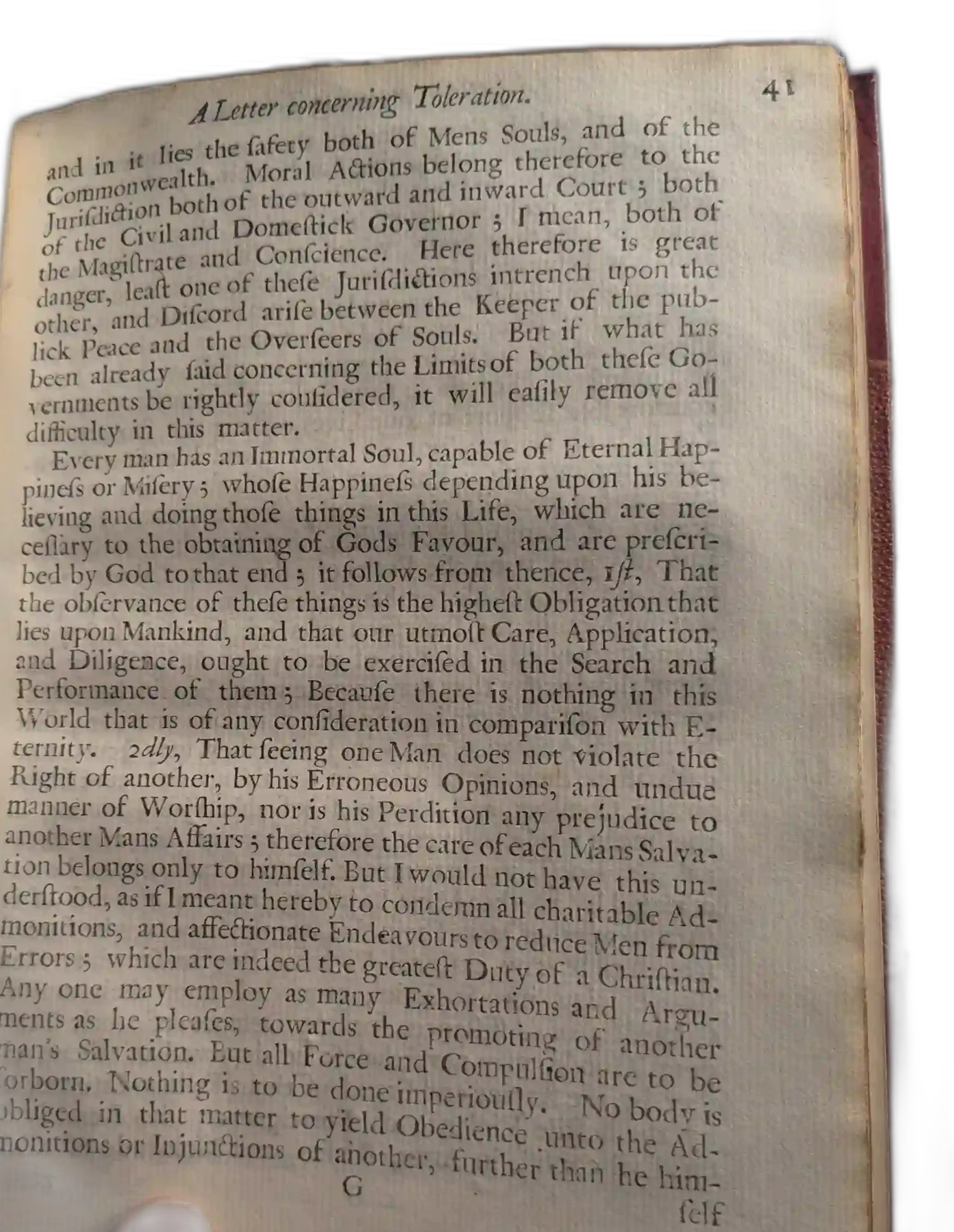
[41]
and in it lies the safety both of Mens Souls, and of the
Commonwealth. Moral Actions belong therefore to the
Jurisdiction both of the outward and inward Court; both
of the Civil and Domestick Governor; I mean, both of
the Magistrate and Conscience. Here therefore is great
danger, least one of these Jurisdictions intrench upon the
other, and Discord arise between the Keeper of the pub-
lick Peace and the Overseers of Souls. But if what has
been already said concerning the Limits of both these Go-
vernments be rightly considered, it will easily remove all
difficulty in this matter.
Every man has an Immortal Soul, capable of Eternal Hap-
piness or Misery; whose Happiness depending upon his be-
lieving and doing those things in this Life, which are ne-
cessary to the obtaining of Gods Favour, and are prescri-
bed by God to that end; it follows from thence, 1st, That
the observance of these things is the highest Obligation that
lies upon Mankind, and that our utmost Care, Application,
and Diligence, ought to be exercised in the Search and
Performance of them; Because there is nothing in this
World that is of any consideration in comparison with E-
ternity. 2dly, That seeing one Man does not violate the
Right of another, by his Erroneous Opinions, and undue
manner of Worship, nor is his Perdition any prejudice to
another Mans Affairs; therefore the care of each Mans Salva-
tion belongs only to himself. But I would not have this un-
derstood, as if I meant hereby to condemn all charitable Ad-
monitions, and affectionate Endeavours to reduce Men from
Errors; which are indeed the greatest Duty of a Christian.
Any one may employ as many Exhortations and Argu-
ments as he pleases, towards the promoting of another
man’s Salvation. But all Force and Compulsion are to be
forborn. Nothing is to be done imperiously. No body is
obliged in that matter to yield Obedience unto the Ad-
monitions or Injunctions of another, further than he him-
Footnotes
- *Deut. 2.